The Best Of Godzilla: 1984-1995
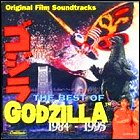 The Best Of Godzilla: 1984-1995 is the second disc in a two-part set of the music of Godzilla (the first disc covered the years 1954-1975). This album contains selections from the films The Return Of Godzilla to Godzilla vs. Destoroyah, which also serves as the second “era” of Godzilla movies. Astute readers may notice a gap of 9 years between discs: This wasn’t a decision on GNP Crescendo’s part not to include those years, there just simply weren’t any movies being made then.
The Best Of Godzilla: 1984-1995 is the second disc in a two-part set of the music of Godzilla (the first disc covered the years 1954-1975). This album contains selections from the films The Return Of Godzilla to Godzilla vs. Destoroyah, which also serves as the second “era” of Godzilla movies. Astute readers may notice a gap of 9 years between discs: This wasn’t a decision on GNP Crescendo’s part not to include those years, there just simply weren’t any movies being made then.
This compliation starts off with The Return Of Godzilla, which (as the name implies) marked the return of Godzilla to the big screen after a 9 year break. The first thing you will notice about the music is that, even though it was composed in the mid-80’s, it doesn’t contain the slick production style that marked so much of the music that came from this decade. The composer, Reijiro Koroku, also decided to keep the musical style of the earlier Godzilla films intact. This is a welcome change from the ’70s pop/disco-infused music that marred such films as Godzilla vs. Megalon.
This would not last, however. In the next film, Godzilla vs. Biollante, composer Koichi Sugiyama uses electric guitars and a heavy rock beat on the song “Bio Wars”, which makes it feel more like Cheap Trick than Godzilla. Needless to say, it’s sorely out of place, considering also that the other two songs that were taken from this film are more of a standard orchestrated style. Video game buffs will also recognize Sugiyama’s name — he’s the principal composer of the Dragon Quest/Dragon Warrior series.
Out of the remaning five films represented on this disc, four of them contain a nice surprise: original composer Akira Ifukube is back on board, and it’s easy to see why. His music is so quintessentially “Godzilla”, it’s hard to think that anybody would try to take his place. This stuff is easily the best on the disc, although he does occasionally lapse into a case of “of the times” and uses synths and other modern sounds and techniques (his remake of “Mothra’s Song” from Godzilla vs. Mothra sounds like it could have easily been performed by Todd Rundgren). Of particular interest is the song “Requiem” from Godzilla vs. Destoroyah: after a dissonant piano/string part, a lone instrument slowly builds up with a few strings until an entire string section plays while a female vocalization sings over it. That description really doesn’t do it any justice — it’s very beautiful, and shows how Ifukube was capable of putting not only suspense and action into his music, but also emotion as well.
This disc is a bit different than its precedessor. Since this compilation only covers 9 years of Godzilla movies, more selections from each movie were included, giving the disc a better overall feel. One wishes that GNP Crescendo could have split the first disc into two parts and not had to include 21 years worth of music on just one disc. Another thing I thought was strange, but welcome — the SFX that were liberally peppered on the first disc are nowhere to be heard here. Maybe it’s because the SFX from these movies weren’t as memorable, but I was glad they decided to focus on the music this time around. One thing, however, that I wish they would have gotten rid of: The closing track, a remake of “Monster Zero March”, once again performed by Neil Norman And His Cosmic Orchestra. Like the first disc, its addition seems wholly arbitrary, and adds no real value (especially on a compilation of the original soundtrack).
 So, if you could only buy one of these discs, which one would it be? I would have to give the nod to 1954-1975 because it contains the original Godzilla music, but listening to that disc alone paints an incomplete picture. Both discs are essential to each other to give a complete overview of the music of Godzilla, and both casual Godzilla enthusiasts and hardcore kaiju fans will find this collection enjoyable. One wonders if GNP Crescendo will be onboard to give us a 1999- compliation sometime in the near future…
So, if you could only buy one of these discs, which one would it be? I would have to give the nod to 1954-1975 because it contains the original Godzilla music, but listening to that disc alone paints an incomplete picture. Both discs are essential to each other to give a complete overview of the music of Godzilla, and both casual Godzilla enthusiasts and hardcore kaiju fans will find this collection enjoyable. One wonders if GNP Crescendo will be onboard to give us a 1999- compliation sometime in the near future…
- Main Theme (Godzilla vs. King Ghidorah) (3:18)
- Main Title (Return Of Godzilla) (1:49)
- Take Shelter/Godzilla vs. Super X (Return Of Godzilla) (2:15)
- Japanese Army March (Return Of Godzilla) (0:47)
- Godzilla’s Exit (Return Of Godzilla) (1:51)
- Ending (Return Of Godzilla) (1:47)
- Scramble March (Godzilla vs. Biollante) (4:27)
- Bio Wars (Godzilla vs. Biollante) (4:36)
- Ending (Godzilla vs. Biollante) (5:00)
- Main Title/UFO Invasion (Godzilla vs. King Ghidorah) (2:57)
- King Ghidorah Attacks Fukuoka (Godzilla vs. King Ghidorah) (0:37)
- Get King Ghidorah (Godzilla vs. King Ghidorah) (1:41)
- Main Title (Godzilla vs. Mothra) (1:25)
- Mahara Mothra (Godzilla vs. Mothra) (0:55)
- Mesa March (Godzilla vs. Mothra) (1:55)
- Rolling Title Ending (Godzilla vs. Mothra) (3:40)
- Mothra’s Song (Godzilla vs. Mothra) (3:47)
- Main Title (Godzilla vs. MechaGodzilla II) (1:35)
- G-Force March #1 (Godzilla vs. MechaGodzilla II) (2:50)
- Prologue/Main Title (Godzilla vs. Space Godzilla) (2:35)
- Bass Island (Godzilla vs. Space Godzilla) (1:21)
- MOGERA vs. Space Godzilla #1 (Godzilla vs. Space Godzilla) (1:28)
- MOGERA vs. Space Godzilla #2 (Godzilla vs. Space Godzilla) (2:37)
- Crystal (Godzilla vs. Space Godzilla) (5:33)
- Main Title/Hong Kong’s Destruction (Godzilla vs. Destoroyah) (3:09)
- Attack Of Super X-3 (Godzilla vs. Destoroyah) (3:00)
- Mesa Tank Super Freeze Attack (Godzilla vs. Destoroyah) (1:55)
- Requiem (Godzilla vs. Destoroyah) (3:49)
- Ending Title (Godzilla vs. Destoroyah) (2:48)
- Monster Zero March – Neil Norman And His Cosmic Orchestra (3:04)
Released by: GNP Crescendo
Release date: 1998
Total running time: 78:31
The Best Of Godzilla: 1954-1975
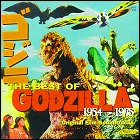 It’s no large secret that Godzilla’s popularity has helped him wreak havoc and chaos on Japan for over 50+ years. But while all the action and mayhem is displayed on the screen, one thing tends to get lost on moviegoers: the music. Fortunently, this disc helps rectify that. Containing the best selections from Godzilla’s tenure on the big screen, The Best Of Godzilla: 1954-1975 is the first part of a two disc set (a companion CD was released as well that covers the years 1984-1995).
It’s no large secret that Godzilla’s popularity has helped him wreak havoc and chaos on Japan for over 50+ years. But while all the action and mayhem is displayed on the screen, one thing tends to get lost on moviegoers: the music. Fortunently, this disc helps rectify that. Containing the best selections from Godzilla’s tenure on the big screen, The Best Of Godzilla: 1954-1975 is the first part of a two disc set (a companion CD was released as well that covers the years 1984-1995).
Like the name implies, this disc covers the years 1954-1975, which ranges from the original Godzilla movie to Terror of MechaGodzilla, and also serves as the first “era” of Godzilla films. The songs here are listed in chronological order, which means that the disc starts off with selections from the original Godzilla, composed by Akira Ifukube. Ifukube’s music lays the groundwork for the film scores to follow: Here, we hear the string-and-horn driven main theme for the first time, as well as the “Japanese Army March” which would later be reused as a continuing theme in the Godzilla universe. “Godzilla’s Rampage” is another fine example of the early soundtrack: its dissonant piano and low, growling horns accentuate the sobering aspect of the giant lizard’s destruction perfectly.
The next major movie to be represented is King Kong vs. Godzilla, which music most Americans never got to hear, since it was replaced in the US with a re-used score from a different film. Akira Ifukube composed the music for this film as well, and keeps the theme that he employed for the previous movies, making the music tense and dramatic.
Mothra vs. Godzilla is next up, and it’s interesting to hear how the film scores have evolved from movie to movie. Ifukube is still onboard, but the music has taken a dramatic leap from the original Godzilla. For example, “Mothra’s Song” sounds like a cross between traditional Japanese music, and the 60’s pop that was so prevalent at the time. It also includes sung lyrics, which was only attemped once before in the “Main Theme” of King Kong vs. Godzilla, but even that didn’t sound nearly as polished as it does here. In fact, out the 3 pieces from Mothra that were selected for this disc, 2 of them have female vocals. This is the film where, I believe, Ifukube really comes into his own style.
Some other top tracks on this disc include the “Main Theme” from Son Of Godzilla, which was composed by Masaru Sato. The shift in musical styles is eminently discernible; instead of the tense, dark mood that Ifukube set with his score, this “Main Theme” sounds more suited to whimsy to gloomy — I can’t help but think this could also double as the theme for The Dick Van Dyke Show! Even though it’s not what you would think of when you think Godzilla, given the subject matter, it works. Another interesting track is the “Godzilla March”, a song specially made for the original LP of the soundtrack to Godzilla vs. Gigan, and composed by Kunio Miyauchi. The song is steeped in 70’s pop/faux-disco that the Japanese seemed to be so found of (see: Lupin ’78 theme song).
As another sign that the times were changing, compare the soundtrack of Godzilla vs. Megalon (composed by Riichiro Manabe) to any of Ifukuda’s original score. The rock beat that accompanies Manabe’s score may cause purists to turn up their noses. Indeed, while Manabe’s compositions may have worked under any different guise, being a part of the Godzilla canon gives it a weaker feel, and lacks the “punch” needed to add emotion to the Godzilla movie.
There are some other shortfalls on the disc as well. Obviously, to dedicate a complete overview of the Godzilla filmography would require nothing short of a box set, but yet it still feels incomplete in the fact that films like Godzilla Raids Again and Godzilla vs. Hedorah (and several others) only being represented by the obligatory “Main Theme” and nothing more. Another qualm I had was the fact that the disc was peppered with tracks of just SFX — classic movie buffs may dig it, but I felt they were included just to pad the disc’s length. Also included on the disc was a version of the “Godzilla Theme” performed by Neil Norman And His Cosmic Orchestra. It’s inclusion seems wholly arbitrary (why place a “modernized” version of a theme song on an album comprised of original music?), and it’s nothing really outstanding, either.
 Your feelings on the disc may be skewed towards which Godzilla era you prefer. But as a primer on the not-so-humble beginnings of Godzilla, it serves as a wonderful introduction, and a nice jumping point for those who may want to explore further into their favorite film’s music, and maybe even try to locate the full soundtrack.
Your feelings on the disc may be skewed towards which Godzilla era you prefer. But as a primer on the not-so-humble beginnings of Godzilla, it serves as a wonderful introduction, and a nice jumping point for those who may want to explore further into their favorite film’s music, and maybe even try to locate the full soundtrack.
- Footsteps FX (Godzilla) (0:36)
- Godzilla Main Theme (Godzilla) (1:31)
- Ootojima Temple Festival (Godzilla) (1:19)
- Japanese Army March (Godzilla) (0:38)
- Godzilla Comes Ashore (Godzilla) (1:51)
- Godzilla’s Rampage (Godzilla) (2:25)
- Ending (Godzilla) (1:42)
- Main Title (Godzilla Rides Again) (1:24)
- Helicopter/Man Screams/SOS FX (King Kong vs. Godzilla) (0:23)
- Main Title (King Kong vs. Godzilla) (1:57)
- King Kong Roars FX (King Kong vs. Godzilla) (0:13)
- Planning King Kong’s Transport (King Kong vs. Godzilla) (2:13)
- Mothra’s Song (Mothra vs. Godzilla) (2:23)
- Mothra FX (Mothra vs. Godzilla) (0:09)
- Main Title (Mothra vs. Godzilla) (1:52)
- Sacred Springs (Mothra vs. Godzilla) (3:49)
- Main Title/Monsters Appear In Yokohama (Ghidorah, The Three Headed Monster) (2:33)
- UFO Approaches/Monsters Fight FX/Monster Battle March (Main Title) (Invasion Of The Astro-Monster) (2:56)
- Main Title (Son Of Godzilla) (2:07)
- Godzilla vs. Kumonga (Son Of Godzilla) (2:16)
- Ending (Son Of Godzilla) (2:46)
- Godzilla FX/Toho Logo/Main Title (Destroy All Monsters) (1:35)
- Title Credits (Destroy All Monsters) (1:23)
- Four Monsters Attack Tokyo (Destroy All Monsters) (1:46)
- Destroying The Remote Control (Destroy All Monsters) (0:40)
- Showdown On Mt. Fuji (Destroy All Monsters) (2:47)
- Ending (Destroy All Monsters) (1:26)
- Cute Kid Theme/Monster Fight (All Monsters Attack) (2:43)
- Godzilla’s Fight (Godzilla vs. Hedorah) (1:09)
- Main Title (Godzilla vs. Gigan) (2:11)
- Main Title Repeat (Godzilla vs. Gigan) (1:26)
- Godzilla March (Record Version) (Godzilla vs. Gigan) (3:09)
- Jet Jaguar/Megalon FX (Godzilla vs. Megalon) (0:15)
- Main Title (Godzilla vs. Megalon) (1:27)
- Godzilla Of Monster Island (Godzilla vs. Megalon) (2:13)
- MechaGodzilla FX (Godzilla vs. MechaGodzilla) (0:30)
- Godzilla vs. Anguiras (Godzilla vs. MechaGodzilla) (2:27)
- Miyarabi’s Prayer (Godzilla vs. MechaGodzilla) (4:03)
- Main Title (Terror Of MechaGodzilla) (4:31)
- MechaGodzilla II (Terror Of MechaGodzilla) (1:44)
- Godzilla’s Entrance (Terror Of MechaGodzilla) (1:14)
- Ending (Terror Of MechaGodzilla) (1:15)
- Theme From Godzilla – Neil Norman And His Cosmic Orchestra (1:33)
Released by: GNP Crescendo
Release date: 1998
Total running time: 78:30
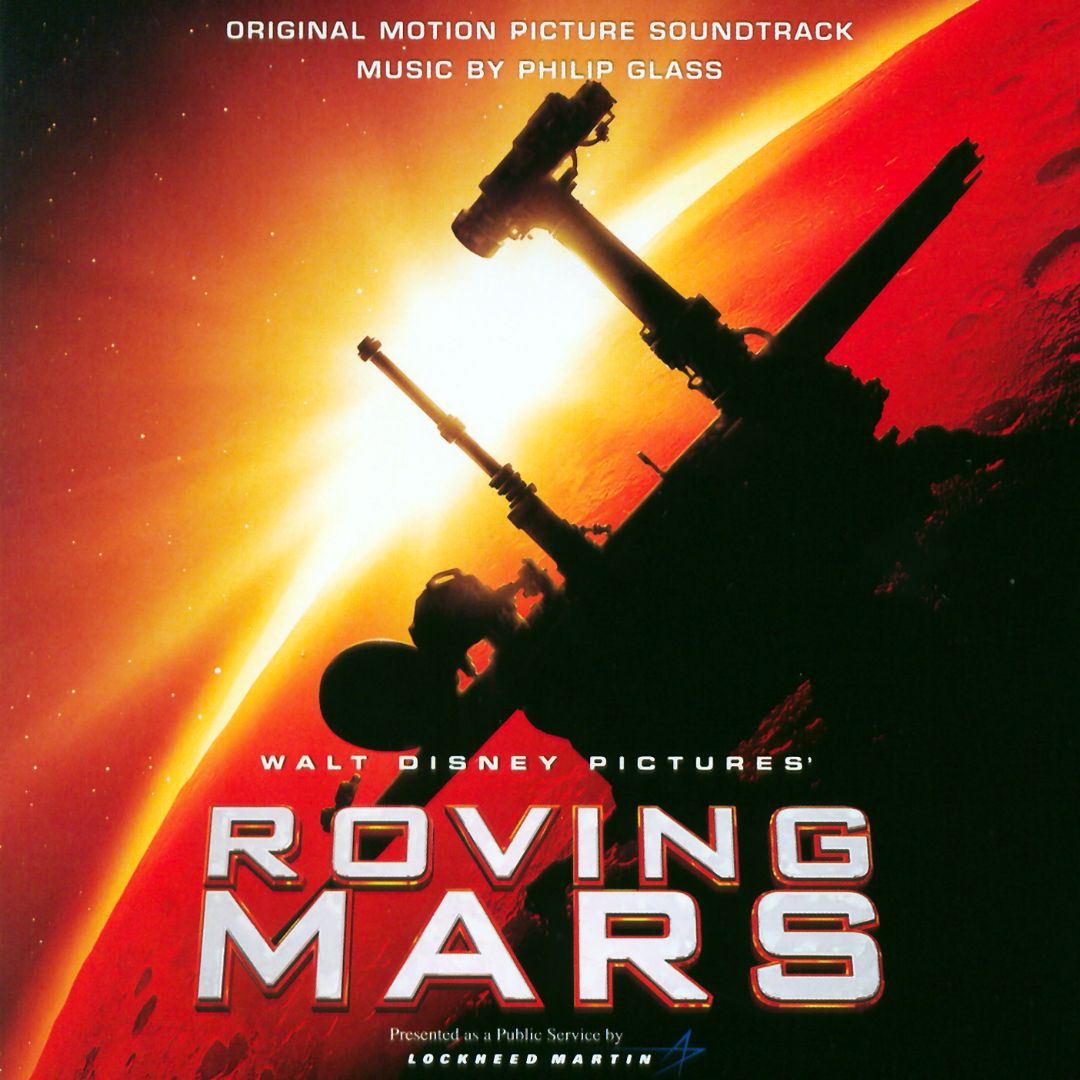
Roving Mars – music by Philip Glass
 Having each lasted well over three years beyond their original planned three-month design life, the two Mars Exploration Rovers are the closest NASA has come, in the first decade of the 21st century, to matching the designed-for-the-short-term-but-built-to-last legacy of the Voyager spacecraft launched in 1977. That these two Rovers overcame mishaps and triumphed in the post-Columbia-disaster lull that still stands as the American space program’s lowest ebb is what makes them worthy of their own movie. (Now, we’ll set aside for the moment that the movie was bankrolled by Lockheed / Martin, the aerospace giant that actually constructed the two Rovers for NASA.)
Having each lasted well over three years beyond their original planned three-month design life, the two Mars Exploration Rovers are the closest NASA has come, in the first decade of the 21st century, to matching the designed-for-the-short-term-but-built-to-last legacy of the Voyager spacecraft launched in 1977. That these two Rovers overcame mishaps and triumphed in the post-Columbia-disaster lull that still stands as the American space program’s lowest ebb is what makes them worthy of their own movie. (Now, we’ll set aside for the moment that the movie was bankrolled by Lockheed / Martin, the aerospace giant that actually constructed the two Rovers for NASA.)
When it came to the music for this low-key documentary about a couple of little robots who could, an inspired choice was made. I don’t really count myself a die-hard Philip Glass fan, but I’m not sure who could’ve done a better job of scoring a Mars Rover movie. With the film’s emphasis on engineering and scientific brilliance, Glass turns in a perfect series of tunes whose musical intricacy matches and melds with the mechanical intricacy of the subject matter. There’s more than a little bit of sentimentality here and there, but Glass wisely avoids pouring on the musical equivalent of anthropomorphizing. His music depicts the Mars Rovers as plucky, determined, patient little machines, and gives them more character (without giving them too much character) than any press release NASA’s ever issued on the subject.
 The highlight is easily “Spirit Vs. Opportunity”, but singling out one piece of music above the others isn’t to imply that there are any that I really didn’t like. Bringing things to a close is a selection of Icelandic rock act Sigur Ros’s patented brew of alternative rock and world music. Roving Mars is a good example of well-judged music for a film that requires a certain sense of wonder.
The highlight is easily “Spirit Vs. Opportunity”, but singling out one piece of music above the others isn’t to imply that there are any that I really didn’t like. Bringing things to a close is a selection of Icelandic rock act Sigur Ros’s patented brew of alternative rock and world music. Roving Mars is a good example of well-judged music for a film that requires a certain sense of wonder.
- Opening Titles (3:21)
- Robot Geologist (2:06)
- Origami Spacekraft (1:20)
- Spirit And Opportunity (0:49)
- Eyes, Hands, Wheels (3:31)
- So Much Of Our Hopes (0:36)
- 7 Months After Launch (2:52)
- Unfolding (2:17)
- Sediments (3:59)
- Landing (3:41)
- Opportunity Vs. Spirit (5:23)
- Floating In Space (2:00)
- Life Itself (2:02)
- Glósóli performed by Sigur Ros (6:16)
Released by: Lakeshore
Release date: 2006
Total running time: 40:13
Wendy Carlos – Digital Moonscapes
 Having given her new studio its shakedown cruise during the recording
Having given her new studio its shakedown cruise during the recording
sessions for the score of Disney’s inscrutably futuristic 1982 movie Tron, composer Wendy Carlos turned to a new challenge – recording a new series of compositions, directly from digital synthesizers with no samples, microphones or any other acoustic recording techniques, fine-tuned until it souded not completely unlike a new piece for orchestra. Jokingly attributing the sounds to the “LSI Philharmonic” (for the large-scale intregrated chips in her new digital synths and recording gear), Carlos created what was almost a modern-day companion piece to Holst’s The Planets, inspired by the then-recent pictures sent back from Jupiter and Saturn by NASA’s Voyager space probes.
Given that my interest in Carlos’ work started with Tron, I’m almost embarrassed to make the comparison, but it must be made – Digital Moonscapes, recorded immediately after the score from that movie, does indeed sound like it could be music from a lost Tron sequel. (And careful listening makes this similarity more than just a coincidence: the piece devoted to Jupiter’s restless volcanic moon Io is actually a rejected cue for Tron‘s light cycle sequence; listening to “Io” side by side with “Light Cycles” from the second volume of Carlos’ Rediscovering Lost Scores reveals the two pieces to be one and the same.) As much as I hate to fall back on a banal comparison, if you liked the music from Tron, Digital Moonscapes is right up your alley.
Trying to get away from that comparison for a moment, Digital Moonscapes is interesting on its own, in some places a little more conventionally classical than that movie soundtrack I keep comparing it to. The other comparison I’ve made, to Holst, deals only with the subject matter. Nowhere in her own liner notes does Wendy Carlos try to draw that comparison, and we’re talking about two completely different kinds of music. As much effort as was put into making Digital Moonscapes sound fully orchestral, there’s no mistaking it for anything but synthesizer music, and ’80s synthesizer music at that. This CD release postdates the original LP by nearly 20 years, though I have an enormous amount of respect for the decision to not tweak the original recordings with more modern technology, because it has a unique character all its own (though I’m a little selfishly disappointed that the thought didn’t occur to add new  material to accompany Voyager 2’s discoveries at Uranus and Neptune). In tracks such as “Titan”, “Europa”, and portions of the three-part “Cosmological Impressions” suite, Carlos comes dangerously close to achieving that orchestral sound.
material to accompany Voyager 2’s discoveries at Uranus and Neptune). In tracks such as “Titan”, “Europa”, and portions of the three-part “Cosmological Impressions” suite, Carlos comes dangerously close to achieving that orchestral sound.
It’ll never shake its distinctly ’80s sound, but in some ways, that’s the charm of Digital Moonscapes, and that’s enough to get a recommendation from me.
Cosmological Impressions
- Genesis (7:12)
- Eden (4:30)
- I.C. (Intergalactic Communications) (3:41)
Moonscapes
- Luna (8:20)
- Phobos and Deimos (3:28)
- Ganymede (4:25)
- Europa (4:19)
- Io (4:26)
- Callisto (4:29)
- Rhea (1:51)
- Titan (3:46)
- Iapetus (5:50)
Released by: East Side Digital
Release date: 1984 (re-released on CD in 2003)
Total running time: 47:31
8 Bit Weapon – Mean Time
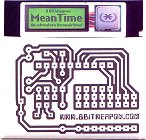 Billed as a selection of tracks left out in the cold from one project or another, 8 Bit Weapon’s latest CD – lovingly packaged, as always, in an authentic floppy disk sleeve – is a mix of material from different “eras” of their history. Released at Classic Gaming Expo 2007, Mean Time is perhaps an indication of how busy 8 Bit Weapon has been with commissions for original material from Disney, among others.
Billed as a selection of tracks left out in the cold from one project or another, 8 Bit Weapon’s latest CD – lovingly packaged, as always, in an authentic floppy disk sleeve – is a mix of material from different “eras” of their history. Released at Classic Gaming Expo 2007, Mean Time is perhaps an indication of how busy 8 Bit Weapon has been with commissions for original material from Disney, among others.
The laid-back ’80s-style instrumental “Times Changing” kicks things off, while “Chronomancer” is much more in line with 8 Bit Weapon’s first album of game music remixes, as is “Flying Spaghetti Monster” (no doubt an ode to those with noodly appendages everywhere). The newest material, as well as the highlight of Mean Time by miles, is “Micro Boogie”, with its vocoder-ized lyrics making it an insanely catchy follow-up to Vaporware Soundtracks‘ “One Last Mission”. Seriously, just try to get this song out of your head. It ain’t easy.
“64 Gigabit Mario Epic” is a curiously titled instrumental with orchestral samples aplenty; I’ve got a hunch that this may be more Seth solo than 8 Bit Weapon, because it just doesn’t sound like it sprang from a SID chip. (But hey, I could be dead wrong there.) “Die Kintergrunde”, a collaboration with Thomas Margolf (also known as the German micromusic act FirestARTer), combines both the retro and modern approaches interestingly, and is a strong runner-up for the catchiest track on the whole CD.
Following that is a couple of tracks that I remember from Seth’s solo project, Unfortunate Brain Chemistry. It’s just possible that the CD that those tracks come from has faded into relative obscurity for casual 8BW fans, so it’s interesting to hear them here. Though one track is labeled as a “SID Mix”, I really couldn’t detect that much of a difference from the Unfortunate Brain Chemistry version.
 “Future Paths” closes things off with a track that once again sounds a little bit more like Seth solo than 8 Bit Weapon, but that’s not a bad thing. Mean Time may not be the most cohesive album in the world (I say album, but running-time-wise it’s more of an EP), but with a spread of material over more than five years, it makes up for it with the Weapon’s uncanny sense of a good, catchy song – and it’ll do the trick nicely in tiding us over for the next CD of all-new material.
“Future Paths” closes things off with a track that once again sounds a little bit more like Seth solo than 8 Bit Weapon, but that’s not a bad thing. Mean Time may not be the most cohesive album in the world (I say album, but running-time-wise it’s more of an EP), but with a spread of material over more than five years, it makes up for it with the Weapon’s uncanny sense of a good, catchy song – and it’ll do the trick nicely in tiding us over for the next CD of all-new material.
- Changing Times (3:34)
- Chronomancer (1:50)
- Flying Spaghetti Monster (1:50)
- Micro Boogie (3:47)
- 64 Gigabit Mario Epic (3:14)
- Die Kintergrunde featuring FirestARTer (4:12)
- Robot Kindergarten (2:28)
- Femme Machine (SID Mix) (5:10)
- Future Paths (2:55)
Released by: 8 Bit Weapon
Release date: 2007
Total running time: 29:00
Babylon 5: The Lost Tales – music by Christopher Franke
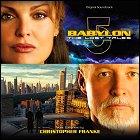 Returning to the musical world of Babylon 5 for the first time since 2002’s one-off Legend Of The Rangers pilot, Christopher Franke makes it seem as though he never went away. The Lost Tales’ music is rife with sounds that I associate with late 80s and early 90s electronic music, which takes me right back to the beginnings of Babylon 5 itself, while his compositional style feels like season 5 is still running Wednesday nights on TNT.
Returning to the musical world of Babylon 5 for the first time since 2002’s one-off Legend Of The Rangers pilot, Christopher Franke makes it seem as though he never went away. The Lost Tales’ music is rife with sounds that I associate with late 80s and early 90s electronic music, which takes me right back to the beginnings of Babylon 5 itself, while his compositional style feels like season 5 is still running Wednesday nights on TNT.
As has already been noted in the DVD review, The Lost Tales is split into two segments on a single DVD, and as such the soundtrack follows suit. At just under 40 minutes, The Lost Tales may seem like a throwback to the days of the one-score-per-disc “episodic” CDs of the late ’90s, but as The Lost Tales itself is abbreviated, with both of its stories not quite racking up 80 minutes total, this isn’t a complete surprise. The music is presented in order, starting with the underscore for the incredibly effective intro sequence and going straight into Lochley’s side of the story, Over Here. Comprising the first 13 tracks, Over Here is largely a rumbling, menacing low drone, with a few moments of apocalyptic flavoring (the church organ in “Energy” and the heartbeat-as-rhythm in “Devil Threat”). While it all sounds authentically Babylon 5 just by virtue of being Christopher Franke music, it’s subtly different from his episode scores of the past.
As with the DVD itself, things really kick into gear starting with track 14 and Sheridan’s story, Over There. The music becomes quite a bit more active, with Franke bringing some of the industrial rhythms and pulsing strings into play that characterized the music from the first season of Babylon 5. In that way, the music from Over There almost goes back in time further than the story itself does, but it’s good stuff. But the end title music, which had no dialogue or effects to compete with, is where Franke finally cuts completely loose, hitting us with apocalyptic choir that surely would’ve spruced things up in Over Here. The Lost Tales on CD is a soundtrack where I got to the end and suddenly thought that the composer was holding back too much during the body of the show itself.
Curiously, while there are opportunities to quote material from the show’s past, Franke chooses only to return to the theme from the end of Sleeping In Light and the opening title theme from season five. Sheridan himself had quite a striking theme in season two, and the show itself had a more enduring theme early on than the season five variant.
 The good news is that, as with the DVD itself, the music of the Lost Tales has room for improvement in the future, provided of course that this direct-to-DVD series drums up sales figures that merit its continuation (and if the same holds true for the soundtrack). While I didn’t think the DVD (or its musical score) was perfect, I’m enthusiastic enough about the potential of the Lost Tales to come along for another ride – and another listen.
The good news is that, as with the DVD itself, the music of the Lost Tales has room for improvement in the future, provided of course that this direct-to-DVD series drums up sales figures that merit its continuation (and if the same holds true for the soundtrack). While I didn’t think the DVD (or its musical score) was perfect, I’m enthusiastic enough about the potential of the Lost Tales to come along for another ride – and another listen.
- Intro 1 (0:51)
- Main Title (0:33)
- Opening (1:23)
- The Priest (1:24)
- Exorcism (1:13)
- The Stench (0:54)
- Your Name (4:07)
- Energy (1:24)
- Devil Threat (2:15)
- The Dream (0:57)
- Log Search (1:18)
- Send Back (3:15)
- Epilogue 1 (1:39)
- Intro 2 (1:36)
- Londo (0:44)
- G’Kar (1:57)
- Hyperspace (0:34)
- Destruction (1:05)
- Kill (1:58)
- I’m Save (1:00)
- Describe (1:16)
- The Station (1:08)
- Starfury (1:11)
- Prepare (2:28)
- Landing (0:36)
- Party (0:30)
- Epilogue 2 (0:36)
- End Credits (1:32)
Released by: Varese Sarabande
Release date: 2007
Total running time: 39:25
The Omega Man – music by Ron Grainer
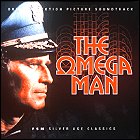 As one of a trilogy of dystopian flicks from the ’60s and ’70s starring Charlton Heston, The Omega Man is notable for being a loose adaptation of Richard Matheson’s novel “I Am Legend” and, in its own very mild way, anticipating the zombie subgenre of horror movies that was yet to come. For film music enthusiasts, however, Omega Man is a rare treasure – it’s an entire score composed by Ron Grainer, the British composer whose opening title music for such TV shows as The Prisoner and Doctor Who instantly captured the heart of those shows. But could he do more than coin catchy opening title music? That’s what I hoped to find out by giving Omega Man a listen.
As one of a trilogy of dystopian flicks from the ’60s and ’70s starring Charlton Heston, The Omega Man is notable for being a loose adaptation of Richard Matheson’s novel “I Am Legend” and, in its own very mild way, anticipating the zombie subgenre of horror movies that was yet to come. For film music enthusiasts, however, Omega Man is a rare treasure – it’s an entire score composed by Ron Grainer, the British composer whose opening title music for such TV shows as The Prisoner and Doctor Who instantly captured the heart of those shows. But could he do more than coin catchy opening title music? That’s what I hoped to find out by giving Omega Man a listen.
Oh, this score is a rare treasure for another reason – a 2000 Film Score Monthly CD release has been its only CD release to date, and all 3,000 copies sold out in what seemed like the blink of an eye. If one of those 3,000 CDs shows up on an online auction site for anything that doesn’t have at least two zeroes to the left of the decimal, that too is a rare thing.
If there’s a previous Grainer work that Omega Man calls instantly to mind, it’s definitely the theme from The Prisoner. Of course one can really only spot this with hindsight; Omega Man hit theaters in 1971, just four years after The Prisoner’s UK premiere, and not everyone had seen The Prisoner (especially outside the UK), and certainly not to a saturation point where casual action moviegoers would recognize the music. The Prisoner’s unmistakable horn figure is heard many times, bringing a brash bravado to many a scene.
I could just about forget trying to make comparisons to Grainer’s previous work after hearing the main theme from this movie. It’s an extremely long-lined melody that just oozes a wonderful sense of world-weariness and manages to sound great at the same time. There’s still a hint of The Prisoner about it, but there’s less swagger and less certainty to it. There’s a feeling of longing, which is completely appropriate for Heston’s character, who’s literally the last man on Earth. As the story wears on, the bravado begins to seep out of the music as the situation gets more desperate. Once we’re past the first two or three tracks, things don’t really kick in and get interesting again until close to the end.
The Omega Man‘s music isn’t timeless, by the way; there are numerous elements which nail it down to a late ’60s/early ’70s sound, with the electric organ (and the way it’s played) frequently being the most obvious of those elements. Some people may find that unpalatable, but I just file it under “endearingly cheesy at times” and keep listening. It was the style of its time, and there’s no mistaking the soundtrack as anything but a product of its time.
As with all of Film Score Monthly’s CDs, the packaging is as impressive as the sound quality of the CD itself, detailing both the music and the movie itself. (It’s worth noting that “I Am Legend” is finally going to hit theaters under its own name, in a new version starring Will Smith, though how faithful the Smith version is  compared to The Omega Man is likely to keep movie fans, and fans of Matheson’s original story, debating for quite a long time.)
compared to The Omega Man is likely to keep movie fans, and fans of Matheson’s original story, debating for quite a long time.)
Great music, if you can overlook some of its dated elements. Did Ron Grainer have the chops to do more than just theme music? The Omega Man answers with a double-barreled “yes.”
- A Summer Place (1:38)
- The Omega Man (3:23)
- Surprise Party (1:41)
- Needling Neville (3:38)
- Swinging At Neville’s (1:07)
- The Spirit Still Lingers (4:30)
- Where Did Lisa Go? (3:41)
- ‘Round Midnight (2:22)
- Jumped By The Family (2:18)
- On The Tumbril (6:08)
- Bad Medicine For Richie (2:15)
- All Through The Night (3:53)
- Zachary Makes His Move (4:49)
- Hope Springs Eternal (4:05)
- Richie On The Roof (3:59)
- Neville Crashes Through (5:33)
- Matthias The Victor (5:13)
- Dutch Takes Over (5:20)
Released by: Film Score Monthly
Release date: 2000
Total running time: 65:33
Crowded House – Time On Earth
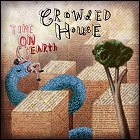 I’m going to admit up front that it’s very hard not to overanalyze a new Crowded House album. In the decade between the final concert appearance of the band’s original lineup at the Sydney Opera House and this album, there’s been at least one book devoted to peering into the members’ psyche, and then Paul Hester died. It’s really difficult not to try to read something in between the lines lyrically, and in terms of Neil Finn’s motivations for trying to rekindle the Crowded House fire.
I’m going to admit up front that it’s very hard not to overanalyze a new Crowded House album. In the decade between the final concert appearance of the band’s original lineup at the Sydney Opera House and this album, there’s been at least one book devoted to peering into the members’ psyche, and then Paul Hester died. It’s really difficult not to try to read something in between the lines lyrically, and in terms of Neil Finn’s motivations for trying to rekindle the Crowded House fire.
With new drummer Matt Sherrod aboard for the ride, and one song co-written with the Dixie Chicks, it’s safe to say that Time On Earth is not a revisitation of the “Don’t Dream It’s Over” stylebook. And that’s not a bad thing; the original Crowded House’s final studio album, Together Alone, was endearing precisely because it was such a daring departure from the sound that had evolved over the first three albums produced by Mitchell Froom. As is generally known now, Time On Earth began its life as Finn’s third solo album, and he reunited with Crowded House bassist Nick Seymour to record some tracks in the wake of Hester’s death. Midway through the recording, the project went from “Finn solo plus Seymour” to the return of Crowded House.
“Nobody Wants To” and the first single, “Don’t Stop Now”, however, stay on safe territory – they’re not a million miles away from the less daring tracks on Together Alone, and certainly not as “out there” as some of the cuts from Finn’s first post-Crowded House solo album. “She Called Up” is stylistically structured a little bit like Together Alone‘s “In My Command” (or the Finn B-side “She Comes Scattered”), and is the one song that reminds the most of Finn’s Split Enz-era songwriting. Which isn’t a bad thing.
Finn’s Beatlesque sensibilities come to the fore in “Pour Le Monde”, which sounds to me almost like Double Fantasy-era Lennon. It’s a lovely, wistful anthem of a song with a sumptuous orchestral backing – not something I’d really expect from Crowded House, but nice nonetheless. “Heaven That I’m Making” also smacks a little bit of Lennon, but reminds me even more of Finn solo tunes like “Secret God”.
It’s hard not to hold up “A Sigh” and “Transit Lounge” as an indication of where Crowded House could be headed if this new lineup records another album. They’re not exactly groundbreaking in and of themselves, but more than anything else on Time On Earth, these two tracks especially break out of the “safe” mold from which the rest of the album seems to be cut. The former is filled with atmospheric guitar effects, while the latter has some very strange effects for the first minute or so before settling into its real melody, which features female vocalists and sounds almost ELO-esque in places. “Silent House” is another standout, co-written by Finn with the Dixie Chicks, taking a bold step closer to Together Alone‘s unapologetic distorted-guitar jams. I think I say this at least once for every album in which Neil Finn is involved, but why this wasn’t the lead single, I’ll never know.
The question of “which songs are about Paul?” was ringing through my head while listening to Time On Earth (and before reading any liner notes), and while “You Are The One To Make Me Cry” (an interesting counterpoint to Woodface‘s “All I Ask”), the surprisingly upbeat “English Trees” and the oustanding “People Are Like Suns” seem to address that tragic event most directly, in listening to the entire album, I think it’s probably safest to say that Hester’s suicide and the resulting emotional turmoil left in his wake informs the entire project from beginning to end. Listened to in one sitting, there’s a melancholy that infuses even the seemingly upbeat songs. And that’s not a bad thing – those of us who have followed Crowded House since before “Don’t Dream It’s Over” nearly topped the U.S. charts in 1987 are also missing Paul Hester, and it’s an interesting sort of shared catharsis between audience and artist that is needed on both sides of the equation. I’d love to make it to one of the live shows to see how much of this catharsis bubbles to the surface with the new material on stage.
 Time On Earth may not sound like a bundle of laughs, with a decidedly not-light-hearted heaviness weaving through much of its material, but it’s some beautiful music, and hopefully a sign that the house can stay crowded for more albums yet to come. Nick Seymour and, on those songs where he appears, Mark Hart (who folks still seem to forget was a full-time regular member of the band when last we left it) weave their magic and prove that there is, indeed, a difference between a new Crowded House album and a new Neil Finn album. I’d love to see them plow a path off the beaten road as they did with Together Alone, and not necessarily even in the same direction. Welcome back, guys.
Time On Earth may not sound like a bundle of laughs, with a decidedly not-light-hearted heaviness weaving through much of its material, but it’s some beautiful music, and hopefully a sign that the house can stay crowded for more albums yet to come. Nick Seymour and, on those songs where he appears, Mark Hart (who folks still seem to forget was a full-time regular member of the band when last we left it) weave their magic and prove that there is, indeed, a difference between a new Crowded House album and a new Neil Finn album. I’d love to see them plow a path off the beaten road as they did with Together Alone, and not necessarily even in the same direction. Welcome back, guys.
- Nobody Wants To (4:10)
- Don’t Stop Now (3:54)
- She Called Up (2:53)
- Say That Again (5:21)
- Pour Le Monde (5:10)
- Even A Child (3:57)
- Heaven That I’m Making (3:56)
- A Sigh (3:17)
- Silent House (5:52)
- English Trees (3:43)
- Walked Her Way Down (4:17)
- Transit Lounge (4:25)
- You Are The One To Make Me Cry (3:43)
- People Are Like Suns (3:52)
Released by: ATO
Release date: 2007
Total running time: 58:30
Iron Butterfly – In-A-Gadda-Da-Vida
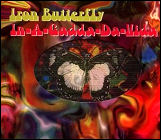 It’s become one of the most recognizable rock riffs in modern history. The “dun-dun-da-da-dun-dun” is known the world over for its melody and heaviness. Although Iron Butterfly may be considered a ’60s one-hit-wonder, their influence and musical stylings paved the way for today’s heavy metal bands. But many people don’t even realize that there was an entire album to go with that one song.
It’s become one of the most recognizable rock riffs in modern history. The “dun-dun-da-da-dun-dun” is known the world over for its melody and heaviness. Although Iron Butterfly may be considered a ’60s one-hit-wonder, their influence and musical stylings paved the way for today’s heavy metal bands. But many people don’t even realize that there was an entire album to go with that one song.
In-A-Gadda-Da-Vida, the album, was released in 1968. Most of the music follows the titular track in terms of composition: Heavy, distorted guitars, clear drumming, and intricate organ melodies. The album kicks off with “Most Anything You Want”, a song which combines all of the aforementioned elements into a moderate rocker. “Flowers And Beads” probably could have been a hit had it been recorded by a band like The Monkees; a “light” (comparatively) tale about love. “My Mirage” is a moody piece set to a lead keyboard theme. “Termination” is another of the signature “hard” songs that Iron Butterfly was known for, and includes a good helping of overdrive. “Are You Happy” is another recording that prominently features the keyboards, and alternately sounds like Jimi Hendrix jamming with Emerson, Lake And Palmer.
But then there’s the track itself: “In-A-Gadda-Da-Vida”. And for those who haven’t heard the full, 17-minute version, it’s a beauty. It also contains an honest-to-God 2 1/2 minute drum solo (which nobody really does anymore, and certainly not for that long!). As a drummer myself, I found it very refreshing. Of course, after the solo, the guitars and keyboards kick back in to perform the now famous chorus and verse one more time.
 The Deluxe Edition of this album released on CD contains two more versions of “In-A-Gadda-Da-Vida”: another lengthy live version, and the much shorter single edit. Although it’s a nice way to fill out the remaining space, they certainly aren’t needed, and one wonders if other selections could have been chosen instead for the bonus material. Nevertheless, if you are a fan of rock music, psychedelia, or just someone who is interested in the origins of music history itself, In-A-Gadda-Da-Vida is not a bad choice to make.
The Deluxe Edition of this album released on CD contains two more versions of “In-A-Gadda-Da-Vida”: another lengthy live version, and the much shorter single edit. Although it’s a nice way to fill out the remaining space, they certainly aren’t needed, and one wonders if other selections could have been chosen instead for the bonus material. Nevertheless, if you are a fan of rock music, psychedelia, or just someone who is interested in the origins of music history itself, In-A-Gadda-Da-Vida is not a bad choice to make.
- Most Anything You Want (3:48)
- Flowers And Beads (3:09)
- My Mirage (4:54)
- Termination (2:52)
- Are You Happy? (4:30)
- In-A-Gadda-Da-Vida (17:07)
- In-A-Gadda-Da-Vida (Live) (18:52)
- In-A-Gadda-Da-Vida (Single Edit) (2:54)
Released by: Atlantic
Release date: 1968 (re-released on CD in 1995)
Total running time: 58:10
Jason Falkner – I’m OK, You’re OK
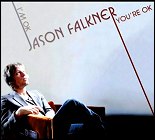 Jason Falkner has been absent from my CD shelf for far too long. The funny thing about Falkner is that, even with just two full studio albums, two or three collections of demos, rarities and B-sides, one cover album and one EP, he’s hailed as a genius by a rabid fan base (of which I must admit to being a member). The irony of it is that his third studio album of original music hasn’t gotten a nibble from an American label as I write this; it’s currently available only as a pricey Japanese import.
Jason Falkner has been absent from my CD shelf for far too long. The funny thing about Falkner is that, even with just two full studio albums, two or three collections of demos, rarities and B-sides, one cover album and one EP, he’s hailed as a genius by a rabid fan base (of which I must admit to being a member). The irony of it is that his third studio album of original music hasn’t gotten a nibble from an American label as I write this; it’s currently available only as a pricey Japanese import.
Falkner’s sunny feel-good power pop is one of a kind. The raucous, jubilant guitar riff that runs throughout “The Knew”, the interweaving, meandering vocal harmonies of “Stephanie Tells Me”, and the hard-to-shake-out-of-your-head hooks of “Say It’s True” and “Komplicated Man” demonstrate why the man and his music have that devoted following. “Anondah” and “This Life Of Mine” hearken back to the best soft rock/power ballads of the ’70s, without most of the excesses cliches that go with that sub-genre (they’re not significantly longer than most of the other tracks, though they “feel” a bit more epic). Falkner also slides comfortably into ’80s-style new wave with songs like “Runaway” and the low-key but infectiously hummable “Hurricane”. As usual, he’s not emulating any particular song from those eras or styles, but is making them his own.
There’s a consistent laid-back vibe to I’m OK, You’re OK, and there aren’t many real “peaks” that break with that mid-tempo feel, with the possible exception of “The Knew”, and even then, there isn’t a blow-down-the-door standout track on the level of “Lost Myself” – and that was the standout from a 6-track EP. That’s not to count points off, but I’m OK gives us a much more subdued side of Falkner, without any big showpieces along the lines of “Lost Myself”, “I Live” or “Holiday”.
 There’s one Japan-only bonus track, “I Don’t Mind”, which is a slightly rockier take on a lyric and a musical idea that’s used elsewhere on the album, almost as if it’s a demo. Whether or not that one song alone will keep Falkner’s fans interested enough to spring for the expensive import edition is really going to be up to the individual. Now I just hope there won’t be such a long wait between this and Falkner’s next solo album.
There’s one Japan-only bonus track, “I Don’t Mind”, which is a slightly rockier take on a lyric and a musical idea that’s used elsewhere on the album, almost as if it’s a demo. Whether or not that one song alone will keep Falkner’s fans interested enough to spring for the expensive import edition is really going to be up to the individual. Now I just hope there won’t be such a long wait between this and Falkner’s next solo album.
- This Time (4:39)
- NYC (3:52)
- The Knew (3:21)
- Stephanie Tells Me (4:50)
- Hurricane (4:51)
- Anondah (5:06)
- Komplicated Man (3:13)
- Runaway (6:24)
- Say It’s True (5:04)
- Contact (4:04)
- This Life Of Mine (4:13)
- I Don’t Mind (5:11)
Released by: Noise McCartney Records / Phantom
Release date: 2007
Total running time: 54:48
Paul McCartney – Memory Almost Full
 It’s hard to imagine, with all the stuff Paul McCartney’s been through in the past ten years – and I trust that I don’t have to elaborate on that – that he could turn out a cheerful classic album like this. It’s also his first U.S. release published by someone other than Capitol Records, the Beatles’ home label Stateside since the beginning; this one was released by a new label started up by, of all people, Starbucks. Yes, the coffee chain. But don’t let any of the above distract you from the fact that this is Sir Paul’s best offering in ten years.
It’s hard to imagine, with all the stuff Paul McCartney’s been through in the past ten years – and I trust that I don’t have to elaborate on that – that he could turn out a cheerful classic album like this. It’s also his first U.S. release published by someone other than Capitol Records, the Beatles’ home label Stateside since the beginning; this one was released by a new label started up by, of all people, Starbucks. Yes, the coffee chain. But don’t let any of the above distract you from the fact that this is Sir Paul’s best offering in ten years.
The first three songs, “Dance Tonight”, “Ever Present Past” and “Your Sunshine”, are a triple-threat reminded of why the man’s considered one of the finest pop songsmiths on the planet, even four decades after most of his lifelong listeners first made his acquaintance. They’re classic specimens of McCarthy’s musical craftsmanship, and they’re just so cheerful that it’s impossible not to crack a smile. “Mister Bellamy” and “Vintage Clothes” also fall into this category, despite the former feeling just a little bit like a follow-up to “Uncle Albert / Admiral Halsey” – this isn’t necessarily a bad thing.
He also proves that he’s still fully capable of rocking out on numbers like “Only Mama Knows” and “That Was Me”, which have both quickly become a couple of my McCartney favorites. “Only Mama Knows” starts out with a string section, but after that brief intro, becomes pure rock ‘n’ roll, while “That Was Me” is an almost obligatory humorous travelogue of McCartney’s past, from his childhood to a little gig in a place called the Cavern and beyond.
Not everything is sunshine on Memory Almost Full, either; things slow down and become more introspective with “You Tell Me” and “End Of The End”. In “End Of The End”, McCartney basically lays down how he’d like to be remembered when he’s gone, a sobering thought to be sure, but it’s also a song that’s virtually destined to be played over his own obituary. There are also just a couple of hints of bitterness at recent events in his life, and the media’s attention to them: he sings “I’m not coming down / no matter what you say / I like it up here anyway” on the seemingly cheerful “Mister Bellamy”. ‘Nuff said.
 What makes the whole endeavour that much more impressive is that McCartney has joined the ranks of the musical hermit crabs with Memory Almost Full. With the exception of any overdubbed orchestral sweeteners, the ex-Beatle literally plays and sings everything himself. You’d have to figure that if anyone in the world would be able to pull something like that off, Paul McCartney would be it. The result is his best album in about ten years – it’s pure Paul, and it’s intensely admirable both for the great music and the pure class of the guy making it. A simply outstanding album.
What makes the whole endeavour that much more impressive is that McCartney has joined the ranks of the musical hermit crabs with Memory Almost Full. With the exception of any overdubbed orchestral sweeteners, the ex-Beatle literally plays and sings everything himself. You’d have to figure that if anyone in the world would be able to pull something like that off, Paul McCartney would be it. The result is his best album in about ten years – it’s pure Paul, and it’s intensely admirable both for the great music and the pure class of the guy making it. A simply outstanding album.
- Dance Tonight (2:52)
- Ever Present Past (2:54)
- See Your Sunshine (3:17)
- Only Mama Knows (4:17)
- You Tell Me (3:15)
- Mister Bellamy (3:39)
- Gratitude (3:17)
- Vintage Clothes (2:22)
- That Was Me (2:38)
- Feet In The Clouds (3:24)
- House Of Wax (4:59)
- End Of The End (2:51)
- Nod Your Head (1:55)
Released by: Hear Music
Release date: 2007
Total running time: 41:40
Witchblade – music by Joel Goldsmith
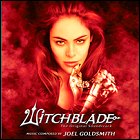 Pressed in a limited run of 1,000 copies, the soundtrack CD from TNT’s troubled two-season wonder Witchblade is just a few years late to the party, but no less welcome for the wait. (Then again, any kind of DVD release for Witchblade is also long overdue.) Even with the CD being confined largely to cues from a small number of first season episodes, it presents a wildly different style of music from Goldsmith’s well-worn Stargate repertoire. Heavy on ethnic instruments, pounding percussion, distorted guitar, eerie synth pads and trippy tastes of prog-rock, Goldsmith’s Witchblade music fits well alongside the show’s preoccupation with classic rock (excerpts of Blue Oyster Cult and Jefferson Airplane weren’t uncommon, and when the Witchblade itself finally spoke in season 2, it spoke with the voice of Grace Slick).
Pressed in a limited run of 1,000 copies, the soundtrack CD from TNT’s troubled two-season wonder Witchblade is just a few years late to the party, but no less welcome for the wait. (Then again, any kind of DVD release for Witchblade is also long overdue.) Even with the CD being confined largely to cues from a small number of first season episodes, it presents a wildly different style of music from Goldsmith’s well-worn Stargate repertoire. Heavy on ethnic instruments, pounding percussion, distorted guitar, eerie synth pads and trippy tastes of prog-rock, Goldsmith’s Witchblade music fits well alongside the show’s preoccupation with classic rock (excerpts of Blue Oyster Cult and Jefferson Airplane weren’t uncommon, and when the Witchblade itself finally spoke in season 2, it spoke with the voice of Grace Slick).
If this description sounds a little familiar, it’s no coincidence – if you like the music of the new Battlestar Galactica series, this isn’t just like it but it’s in the same neighborhood. The score cues are interspersed with several original songs composed by Goldsmith that featured prominently in the show. Those numbers tend to be rocked-out but very atmospheric techno-metal, with the vocals heavily processed. “The Gauntlet Suite” in particular lives up to the show’s prog rock pedigree, with its trippy synth work and its sheer length.
There are a small number of tracks that appear to have been composed for, but not used in, the series, including one of the aforementioned songs; if there’s just one thing missing from the otherwise fine liner notes booklet – in which the show’s writers and producers wax nostalgic for the challenge of keeping the show on the air and the wonders of hearing Goldsmith’s music for the first time – an explanation of what happened with these pieces of music is it.
 Witchblade may have faded into obscurity – there’s been more buzz about the anime version, which has already generated at least two soundtrack CDs of its own, then there’s been reminiscing about the short-lived live action series – but this soundtrack is proof that its brief existence was a flashpoint of intense creativity for all involved. Hopefully Joel Goldsmith will have a chance to spread his wings, with the Stargate franchise losing a bit of steam, and demonstrate this kind of intensity again. Well worth the wait.
Witchblade may have faded into obscurity – there’s been more buzz about the anime version, which has already generated at least two soundtrack CDs of its own, then there’s been reminiscing about the short-lived live action series – but this soundtrack is proof that its brief existence was a flashpoint of intense creativity for all involved. Hopefully Joel Goldsmith will have a chance to spread his wings, with the Stargate franchise losing a bit of steam, and demonstrate this kind of intensity again. Well worth the wait.
- Danny’s Funeral (1:18)
- The Church (1:58)
- Brotherly Love (2:27)
- Strange Days (3:36)
- Fire Breather (1:27)
- Maelstrom (1:00)
- Walk Swiftly (1:48)
- The Gauntlet Suite (7:44)
- Missing Link (2:06)
- The Fire Dance (1:58)
- A Fine Dream (1:05)
- Sarah’s Home (2:16)
- Emergence (3:02)
- Retro Motorcycles (2:06)
- Vague Reckoning (4:47)
- Matters Of Truth (2:06)
- Milk And Honey (2:57)
- Conundrum (1:23)
- A Violent Prayer (2:43)
- Patience (2:51)
- Bad Man (2:14)
- A Walk In The Park (2:11)
- Very Dark Days (1:58)
- Sarah’s Metamorphosis (6:17)
- Witchblade Main Title (0:46)
- Walking Lightly On Delicate Mist (9:45)
Released by: Free Clyde Music
Release date: 2007
Total running time: 73:48
Yum Yum Children – Used To Would’ve
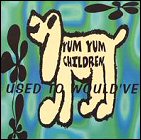 Usually when you think of the genres “psychedelic” and “Christian”, it’s not in the same sentence. However, that’s exactly what the band Yum Yum Children was trying to accomplish. Recorded in 1996, this album sounds like a slab of lost 70’s rock just recently getting unearthed for the first time.
Usually when you think of the genres “psychedelic” and “Christian”, it’s not in the same sentence. However, that’s exactly what the band Yum Yum Children was trying to accomplish. Recorded in 1996, this album sounds like a slab of lost 70’s rock just recently getting unearthed for the first time.
The album starts off with the light rocker “Leave It Alone”, which brings to mind the earlier bubblegum records of yore, albeit with more guitars and electric organs. From there, however, things get stranger. “End Of My Needs” lumbers along with a single guitar lead, a hi-hat, and lead singer R. Leon Goodenough’s vocals quietly hanging above the music. Halfway through, the song picks up, adding more guitars and percussion while changing the tempo, and then comes around full circle to start the second verse. “Refrigerator” is similar in execution, but resembles a slow jam. The amplifier buzz in the background again brings to mind a lo-fi 70’s vibe.
“Burnin’ Thing” starts out as a soft piano…err, organ ballad, but quickly turns into a mess of noise, complete with screeching guitars and vocals. But even so, the oddest track by far is the closing number “Life Without Jesus”, in which the female vocalist of the band, Jennifer Goodenough, recites a spoken word poem while guitars and a Farfisa organ swirl around. The band slowly picks up the tempo and the volume until it sounds like the band is ready to lose it while wordless vocalizing is heard in the background. The track ends with a bang, and the organs fade away.
 It’s a shame that the Yum Yum Children were so mired in obscurity. This and their previous two albums (Dufisized and Tastythanks) were released with little or no fanfare from their record label, and they soon faded away afterwards. The good news is that if you happen to stumble upon this disc, it can usually be had for cheap. But for a group that was able to meld two different trains of thought to create something original (especially within the hard-nosed Christian community), they deserved much better.
It’s a shame that the Yum Yum Children were so mired in obscurity. This and their previous two albums (Dufisized and Tastythanks) were released with little or no fanfare from their record label, and they soon faded away afterwards. The good news is that if you happen to stumble upon this disc, it can usually be had for cheap. But for a group that was able to meld two different trains of thought to create something original (especially within the hard-nosed Christian community), they deserved much better.
- Leave It Alone (3:05)
- Irrigate (3:07)
- The Too Big Dying Part (3:11)
- End Of My Needs (5:12)
- Refrigerator (4:23)
- Naked (3:23)
- Kind And Loving Man (2:11)
- Daze Of Un-Understanding (3:22)
- Burnin’ Thing (3:09)
- Be Like You (2:05)
- Life Without Jesus (4:14)
Released by: Five Minute Walk
Release date: 1996
Total running time: 37:44
The Martian Chronicles – music by Stanley Myers
 I barely remember the lavish 1979 British/U.S. co-production of Ray Bradbury’s The Martian Chronicles. I seem to remember being hyped up about it (as I was about most anything that had to do with space), seeing a little bit of it, and then my mom deciding unilaterally that this miniseries was Not For Me. And oddly enough, I haven’t seen it in its entirety since, despite it being on DVD these days. (That’s a gap in my SF TV knowledge I need to correct one of these days, come to think of it.) But boy, do I remember the music. I had already seen Battlestar Galactica and Buck Rogers (and, of course, Star Wars) by this point, but The Martian Chronicles clearly had Music From The Future. With its futuristic synth sweeps giving it a foothold in the new wave sound while its orchestral components were firmly tied to the disco-fied ’70s, The Martian Chronicles’ music is bold, brassy, memorable, and that spacey element pushes it just far enough across the line to make it sound, musically, a bit like a science fiction version of Dallas.
I barely remember the lavish 1979 British/U.S. co-production of Ray Bradbury’s The Martian Chronicles. I seem to remember being hyped up about it (as I was about most anything that had to do with space), seeing a little bit of it, and then my mom deciding unilaterally that this miniseries was Not For Me. And oddly enough, I haven’t seen it in its entirety since, despite it being on DVD these days. (That’s a gap in my SF TV knowledge I need to correct one of these days, come to think of it.) But boy, do I remember the music. I had already seen Battlestar Galactica and Buck Rogers (and, of course, Star Wars) by this point, but The Martian Chronicles clearly had Music From The Future. With its futuristic synth sweeps giving it a foothold in the new wave sound while its orchestral components were firmly tied to the disco-fied ’70s, The Martian Chronicles’ music is bold, brassy, memorable, and that spacey element pushes it just far enough across the line to make it sound, musically, a bit like a science fiction version of Dallas.
Anchoring the entire theme as a heavily-used (and very adaptable) leitmotif is the “Space March”, which appears in its full form several times during the album. (The fullest expression of it is in the track “The Silver Locusts”; the track actually titled “Space March” is much more brief.) Elements of this theme eventually split off on their own and become a brooding, serious theme that recurs in many of the later scenes, as heard in such cues as “Million Year Picnic”. The action and suspense cues turn out to be the bits that haven’t aged gracefully, instantly dating themselves to the 1970s with disco-style guitar work and percussion.
 And yet, for all of these things that should be fatal blows, the music from The Martian Chronicles works quite well in its own little continuum. The late British composer Stanley Myers (who composed, among a great many other things, a very early Doctor Who adventure) did a great job of devising very adaptable themes and motifs, and then developing those fully. It may come across as a bit cheesy according to modern sensibilities, but it’s a musical time capsule of sorts, and one that I enjoy returning to quite a bit.
And yet, for all of these things that should be fatal blows, the music from The Martian Chronicles works quite well in its own little continuum. The late British composer Stanley Myers (who composed, among a great many other things, a very early Doctor Who adventure) did a great job of devising very adaptable themes and motifs, and then developing those fully. It may come across as a bit cheesy according to modern sensibilities, but it’s a musical time capsule of sorts, and one that I enjoy returning to quite a bit.
The Expeditions
- Prologue (2:19)
- The Martian Chronicles Theme (2:03)
- Space March (0:59)
- Ylla’s Dream (1:39)
- Mask Of Conflict (2:19)
- Mr. K Returns (1:22)
- Concern For The Future (0:44)
- Mrs. Black’s Piano (1:13)
- Realization (0:11)
- Saying Goodbye (1:24)
- Col. Wilder’s Promise (3:14)
- Spender’s Anger / One Of Our Own (2:26)
- Martian City (2:37)
- Hunting Spender / Is This How It Will Be? (3:43)
The Settlers
- The Silver Locusts (2:39)
- Lustig’s Visitor (4:03)
- Return To The Dead City (2:01)
- David Is Confused (1:18)
- Chase In First Town (1:25)
- Father Peregrine’s Vision (4:55)
- Col. Wilder’s Thoughts / Rumors Of War (1:32)
- The Martian Appears (0:18)
- Parkhill Sees Earth Destroyed (0:40)
- Dead Earth (0:37)
The Martians
- Final Conflict (1:56)
- Hathaway’s Last Chance (0:52)
- Lights In The Sky (2:06)
- Ben And Genevieve (2:41)
- Never Give Up Hope (0:59)
- Hathaway Dies (1:03)
- Martian Highway (0:46)
- Memories (1:07)
- Placing The Explosives / Canal Journey (2:36)
- Setting Up Camp (1:13)
- The Million Year Picnic (2:53)
- End Titles / bonus track: Source Music (4:52)
Released by: Airstrip One Company
Release date: 2002
Total running time: 68:45
Who’s Serious: The Symphonic Music of the Who
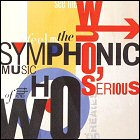 It’s been a concept as old as the music industry itself. Whenever you need to need to squeeze out a few more dollars from a songwriter’s catalog of hits, simply hire an in-house orchestra to record those same songs in a more “classical” setting. It started with 101 Strings in 1957, and continues to this day with the “String Tribute To…” albums that seem to get churned out more and more each week. But what if the orchestra that offers the tribute is worthy of tribute themselves?
It’s been a concept as old as the music industry itself. Whenever you need to need to squeeze out a few more dollars from a songwriter’s catalog of hits, simply hire an in-house orchestra to record those same songs in a more “classical” setting. It started with 101 Strings in 1957, and continues to this day with the “String Tribute To…” albums that seem to get churned out more and more each week. But what if the orchestra that offers the tribute is worthy of tribute themselves?
Who’s Serious is one item from a line of rock-meets-symphony albums by the London Philharmonic Orchestra (Jimi Hendrix, Rolling Stones, Pink Floyd, etc.), with The Who being the band toasted. But just one listen and you can tell that this is a cut above your average “tribute” album. The album kicks off with “Overture”, a medley of Who hits performed by Roger Daltrey’s touring band. The next track starts the album off proper, with “I Can See For Miles” being performed by the Orchestra. They continue with a string (sorry, bad pun) of The Who’s songs until the last track, “Listening To You,” is again recorded by Roger Daltrey’s band.
One thing I noticed while listening to the album: the arrangements are top-notch. The melody, in particular, captures Roger Daltrey’s inflections perfectly (for example, the “hiccup” on “Who Are You”). But there are still some qualms present. First, only a handful of The Who’s most well-known songs were chosen, meaning that this probably won’t appeal to casual Who fans. Who purists, on the other hand, may also find fault with the fact that the Orchestra may have taken liberties with the arrangements (“Baba O’Riley”, for instance, repeats the first verse and chorus before going into the second verse). Thirdly, even though Roger Daltrey’s touring band performs on the bookends of the album, there is little mention of them in the liner notes besides listing each member of “The Band”. Maybe it’s just because I obessively catalog my music collection, but I would have prefered a little more than that to go on. And lastly, despite all the good intentions and professionalism  brought to this project, one gets the feeling that the only reason this came about was to, yes, line someone’s coffers.
brought to this project, one gets the feeling that the only reason this came about was to, yes, line someone’s coffers.
It probably goes without saying that if you’re new to The Who, then you should pick up the original recordings first. But for Who fans looking for a new twist on some old favorites, this may well be the album for you.
- Overture(6:18)
- I Can See For Miles(3:21)
- Pinball Wizard / See Me, Feel Me(5:13)
- My Generation(5:51)
- Dr. Jimmy(12:30)
- Baba O’Riley(5:34)
- 5:15(7:44)
- Love Reign O’er Me(6:41)
- Who Are You(4:37)
- Listening To You (from We’re Not Going To Take It)(4:48)
Released by: BMG
Release date: 1998
Total running time: 63:03
Space Knight Tekkaman – music by Bob Sakuma
 From the team behind Kagakuninjatai Gatchaman (known to the English speaking world primarily as Battle Of The Planets) came another, slightly more obscure creation later in the 1970s. Though it’s not meant to occupy the same “universe” as G-Force, Tekkaman shares many (perhaps unavoidable) similarities: the artists at Tatsunoko Studios devised a very similar look, complete with a tinted motorcycle-helmet-inspired visor, immediately inviting comparisons with the character designs of Gatchaman, and Tekkaman’s adventures were scored by Bob Sakuma, the inventive composer behind the original Gatchaman music. Still in “Chicago mode” for his new assignment – Sakuma has openly admitted that the jazzy rock-disco stylings of his 70s anime scores were inspired by the American rock group – Sakuma still manages to create a slightly different musical setting for Tekkaman.
From the team behind Kagakuninjatai Gatchaman (known to the English speaking world primarily as Battle Of The Planets) came another, slightly more obscure creation later in the 1970s. Though it’s not meant to occupy the same “universe” as G-Force, Tekkaman shares many (perhaps unavoidable) similarities: the artists at Tatsunoko Studios devised a very similar look, complete with a tinted motorcycle-helmet-inspired visor, immediately inviting comparisons with the character designs of Gatchaman, and Tekkaman’s adventures were scored by Bob Sakuma, the inventive composer behind the original Gatchaman music. Still in “Chicago mode” for his new assignment – Sakuma has openly admitted that the jazzy rock-disco stylings of his 70s anime scores were inspired by the American rock group – Sakuma still manages to create a slightly different musical setting for Tekkaman.
What it has in common with Gatchaman is Sakuma’s trademark bold, funky brass – you can definitely tell the same person is behind the music of both shows. The most obvious “new” element to the Tekkaman music is a wordless solo female vocal that floats above the rest of the music. Strangely enough, there are instruments and frequently vocals that have a completely different amount of reverb than the rest of the music. It doesn’t really detract from anything, but this odd production technique does tend to draw attention to itself.
There are guitar passages that cross the line from funky into hard rock territory, making for some interesting  new twists on the style Sakuma had established with the earlier series. But for the most part, if you enjoyed Bob Sakuma’s original Gatchaman music, Tekkaman makes a nice companion piece to it. This is one of those cases where a “sounds like…” or “customers who bought this also bought that” recommendation are probably right on the money.
new twists on the style Sakuma had established with the earlier series. But for the most part, if you enjoyed Bob Sakuma’s original Gatchaman music, Tekkaman makes a nice companion piece to it. This is one of those cases where a “sounds like…” or “customers who bought this also bought that” recommendation are probably right on the money.
- Tekkaman no Uta (2:48)
- Hoshi Kara Kita Otoko (2:55)
- Hiromi to Mutan (4:46)
- Chikyuu Ryakudatsu Shirei (4:50)
- Gekitou no Tekkaman (4:47)
- Minamijuujisei (2:37)
- Yameru Chikyuu (1:45)
- Voltekka (0:09)
- Harukanaru Sanno-sei (3:36)
- Weekend (4:27)
- Waldaster Trap (3:37)
- Taiyou no Yuusha (3:27)
- Leap, Tek Set! (3:52)
- Saigo no Tekkaman (3:09)
- Space Knights no Uta (0:44)
Released by: Columbia Japan
Release date: 2004
Total running time: 47:29
Over The Hedge – music by Rupert Gregson-Williams
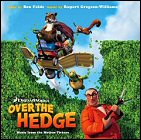 A pleasant selection of Rupert Gregson-Williams’ lively orchestral score combined with about an EP’s worth of material both new and familiar from Ben Folds, the CD from Dreamworks’ Over The Hedge may just be 2006’s most underrated soundtrack.
A pleasant selection of Rupert Gregson-Williams’ lively orchestral score combined with about an EP’s worth of material both new and familiar from Ben Folds, the CD from Dreamworks’ Over The Hedge may just be 2006’s most underrated soundtrack.
The score tracks are unapologetically bold and colorful, but it’s not without subtleties. Instead of going for the usual Carl Stalling-esque tendencies (not that there’s anything wrong with Stalling) for scoring a movie aimed at kids, Rupert Gregson-Williams delivers a rather in-your-face dramatic underscore. It’s fun and full of action. It seems like movie and TV music has tried to get away from this sort of full-blooded orchestral treatment in recent years, in favor of electronics or techno or ethnic/exotic music. There’s room for all of those styles on the same music shelf, and I can honestly say that I just don’t hear enough music like this these days – my compliments to the maestro.
Ben Folds’ contributions are a little more varied; I find myself shrugging a bit at the watered-down remake of “Rockin’ The Suburbs” (though I’d say it’s still worth it for the William Shatner rant that takes the place of at least one whole verse), but “Family Of Me” and “Still” won’t disappoint Folds fans. The latter rambles on a bit, so naturally, it’s on the album in two forms. “Trapped In The Supermarket” is another track that one has to be in the right mood for; its lyrics are a bit repetitive, so its strongest appeal lies in Folds’ relentlessly good musicianship and vocals.
 Rather than being yet another piece of tie-in merchandise for a massively-marketed kids’ movie, Over The Hedge makes for good listening material. I originally picked it up for the Ben Folds songs, but have wound up playing the whole thing quite a few times over the past several months – it’s all worth a listen.
Rather than being yet another piece of tie-in merchandise for a massively-marketed kids’ movie, Over The Hedge makes for good listening material. I originally picked it up for the Ben Folds songs, but have wound up playing the whole thing quite a few times over the past several months – it’s all worth a listen.

- Family Of Me – Ben Folds (1:28)
- RJ Enters The Cave (4:37)
- The Family Awakes (2:33)
- Heist – Ben Folds (3:02)
- Lost In The Supermarket – Ben Folds (3:30)
- Let’s Call It Steve (3:40)
- Hammy Time (2:28)
- Still – Ben Folds (2:38)
- Play? (1:49)
- Rockin’ The Suburbs (Over The Hedge version) – Ben Folds & William Shatner (4:57)
- The Inside Heist (7:38)
- RJ Rescues His Family (4:18)
- Still (Reprise) – Ben Folds (6:07)
Released by: Epic
Release date: 2006
Total running time: 48:45
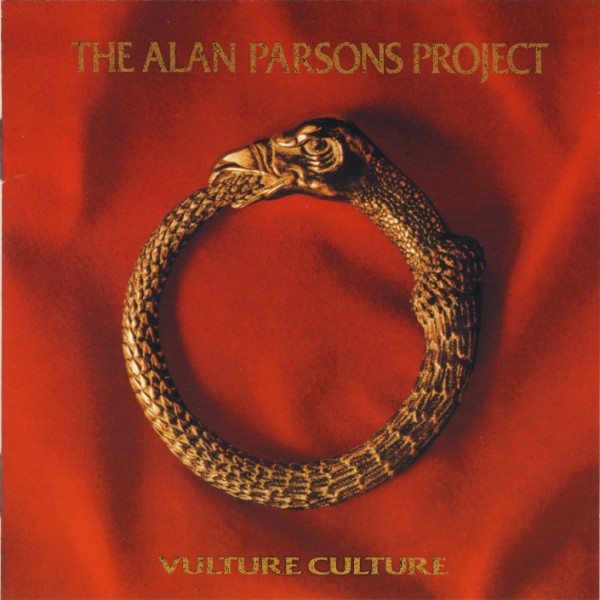
Alan Parsons Project – Vulture Culture (remastered)
 The first (and only) Alan Parsons Project album with no orchestral element whatsoever, Vulture Culture has some decent songs, but a few things working against it. By the tiime of this album’s original release, the Project’s home label, Arista, was so enamoured of Eric Woolfson’s voice that they all but dictated that they wanted to hear the bulk of the songs sung by the same voice that had sung the smash hit “Eye In The Sky”. Even two albums on, as much as I like Woolfson’s almost Orbison-esque voice, Vulture Culture features his voice on songs he simply shouldn’t have sung – they just required a different delivery than his sometimes overly sweetened stage-musical sensibilities.
The first (and only) Alan Parsons Project album with no orchestral element whatsoever, Vulture Culture has some decent songs, but a few things working against it. By the tiime of this album’s original release, the Project’s home label, Arista, was so enamoured of Eric Woolfson’s voice that they all but dictated that they wanted to hear the bulk of the songs sung by the same voice that had sung the smash hit “Eye In The Sky”. Even two albums on, as much as I like Woolfson’s almost Orbison-esque voice, Vulture Culture features his voice on songs he simply shouldn’t have sung – they just required a different delivery than his sometimes overly sweetened stage-musical sensibilities.
I’ll admit that Vulture Culture just edges out Stereotomy for the dubious honor of being my least favorite Project album, but having listened to the whole thing anew with this nicely remastered edition, I have to say that, at least lyrically, I may not be giving this album its due. It’s a somewhat unsubtle commentary on the exploitative side of our culture, but there are nuances I hear in the lyrics now that I just didn’t “get” back in those carefree days when I didn’t have a mortgage, or any concerns about building up savings for my child’s eventual education. The title track hits me in a whole different way now, as does “Separate Lives”.
Added to Vulture Culture for this reissue are both a demo and a finished version of “No Answers Only Questions”, a track recorded for this album, but dropped before the final edit. It brings a more simplistic, direct and altogether less flowery approach to the album’s topical theme, and perhaps is all the better for not burying itself under layers and layers of production. As much as I like the finished version (which was also the “unreleased track” used to lure folks into buying the 3-CD Dutch Collection / Essential Alan Parsons Project / whatever other names the compilation had in various territories), I think I may like the slightly looser, folkier demo version better.
A slightly different mix of “Separate Lives” and a very rough early demo of the instrumental “Hawkeye” are included, as well as the customary “naked” medley, featuring instrumental excerpts from several songs on the album. “The Naked Vulture” also features various improvised spoken word bits by Lee Abrams (credited on the album as an anagram of his name, “Mr. Laser Beam”) which were later edited into transitions between songs. I almost wonder if perhaps the Lee Abrams material shouldn’t have been its own track, separate from the music, because here it shows up repeatedly as a transition, which takes me right out of the music itself when I’m listening.
The booklet surprises me a bit here – it reveals that there’s going to be quite a bit of repetition of the essay material from album to album – and it also dances around the problems that Parsons and Woolfson were experiencing with Arista at the time (from the insistence on Woolfson lead vocals to the disputed, never-released album The Sicilian Defense). Even more surprisingly, it features a coda that hints at possible future collaborations between Parsons and Woolfson, which makes me wonder if perhaps something isn’t already waiting to happen once the remastered albums are all released, a la Crowded House’s “surprise” reunion on the heels of the DVD and CD release of their 1996 farewell concert. Vulture culture, indeed.
 In the end, sadly, I can really only give this album three stars – while I apprciated the lyrics more, the delivery on many of them is all wrong thanks to Arista’s interference, and the album’s inherent weaknesses carry through to some of the bonus material, which takes the shine off of things just a bit.
In the end, sadly, I can really only give this album three stars – while I apprciated the lyrics more, the delivery on many of them is all wrong thanks to Arista’s interference, and the album’s inherent weaknesses carry through to some of the bonus material, which takes the shine off of things just a bit.
- Let’s Talk About Me (4:29)
- Separate Lives (4:38)
- Days Are Numbers (The Traveller) (4:52)
- Sooner Or Later (4:24)
- Vulture Culture (5:22)
- Hawkeye (3:48)
- Somebody Out There (4:54)
- The Same Old Sun (5:26)
- No Answers Only Questions (Final Version) (2:10)
- Separate Lives (Alternative Mix) (4:16)
- Hawkeye (Demo) (3:17)
- The Naked Vulture (10:42)
- No Answers Only Questions (The First Attempt) (2:57)
Released by: Legacy / Arista
Release date: 2007 (originally released in 1985)
Total running time: 61:23
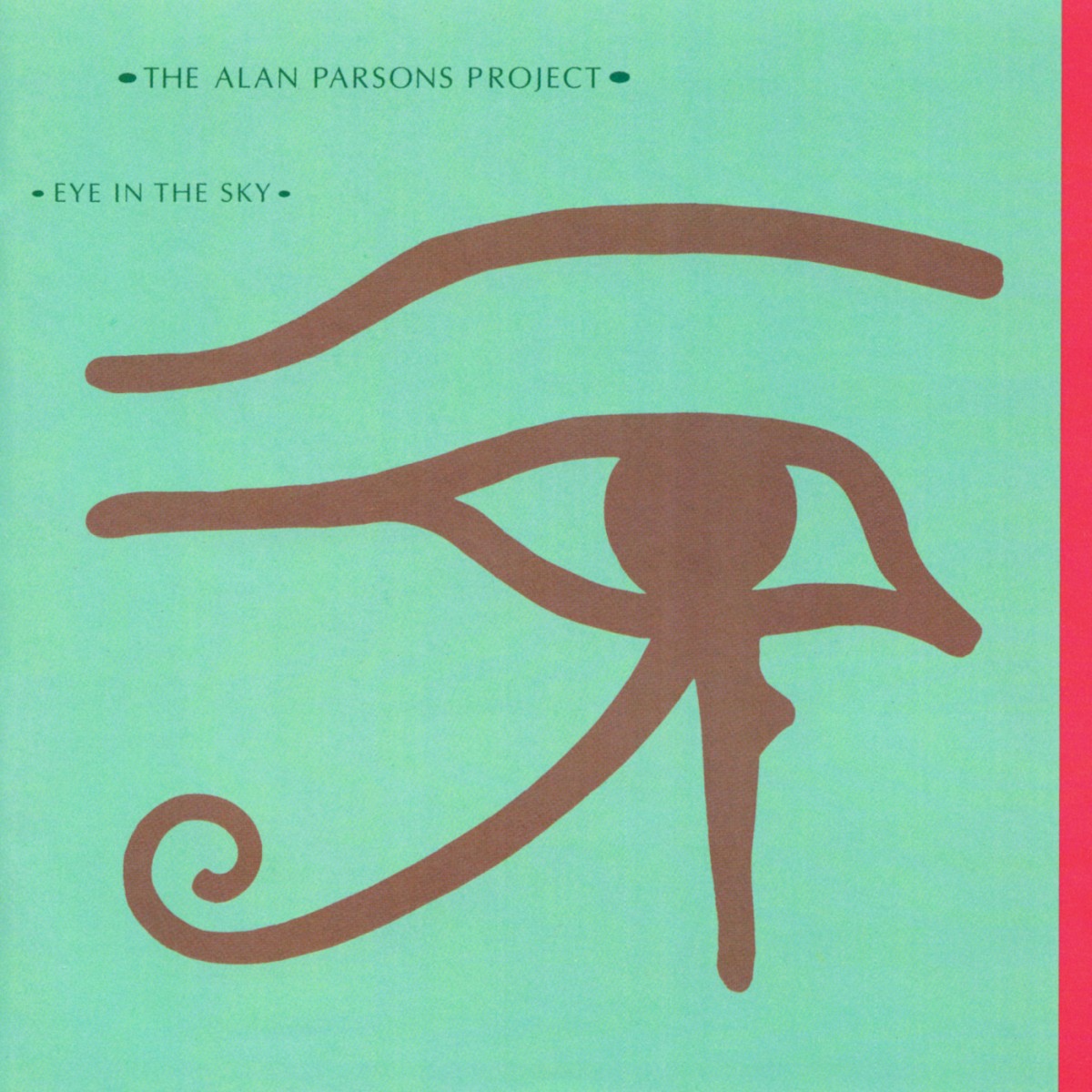
Alan Parsons Project – Eye In The Sky (remastered)
 As innovative as Tales Of Mystery And Imagination and I Robot were, and regardless of how forward-looking more recent works like A Valid Path have been, like it or not, for most people the epitome of the Alan Parsons Project is this album. Veering off the band’s prog rock path and into radio-friendly rock territory, Eye In The Sky is tame compared to some of the more literary-minded Project albums, but it still boasts some great songs, freshly-remastered until they’re nice and crisp for this release. As overplayed-by-radio as they were in the day, it’s hard to deny the staying power and just pure catchiness of the Sirius / Eye In The Sky combo, or the popular instrumental Mammagamma. Children Of The Moon, with its lyrics more relevant now than they were in 1982, may be better than all of them put together, but hasn’t had quite the exposure.
As innovative as Tales Of Mystery And Imagination and I Robot were, and regardless of how forward-looking more recent works like A Valid Path have been, like it or not, for most people the epitome of the Alan Parsons Project is this album. Veering off the band’s prog rock path and into radio-friendly rock territory, Eye In The Sky is tame compared to some of the more literary-minded Project albums, but it still boasts some great songs, freshly-remastered until they’re nice and crisp for this release. As overplayed-by-radio as they were in the day, it’s hard to deny the staying power and just pure catchiness of the Sirius / Eye In The Sky combo, or the popular instrumental Mammagamma. Children Of The Moon, with its lyrics more relevant now than they were in 1982, may be better than all of them put together, but hasn’t had quite the exposure.
For this most popular Project, there are only a few bonus tracks, and how much you’ll get into them is really going to rely on how “into” the Project and its recording process you are. Early Eric Woolfson guide vocal versions of “Silence And I” and “Old And Wise” are presented here, the latter of which is interesting since he didn’t sing on the final recording. There are also rough demos of the instrumental “Sirius” and the unfinished Woolfson tune “Any Other Day,” which is heard here in such an early form that it doesn’t even have lyrics. The intro for “Any Other Day” became the intro to a big orchestral bridge section for “Silence And I,” though the liner notes say that Woolfson is just now finishing “Any Other Day” for inclusion in an upcoming stage musical.
The real meat and potatoes of the bonus tracks can be found in the form of two medleys, “The Naked Eye” and “Eye Pieces (Classical Naked Eye)”. The former presents stripped-down excerpts from the recording sessions, showing how some of the songs might have developed slightly differently (especially “Psychobabble” and “Mammagamma”). But the latter is an impressive collage of the orchestral and choral overdubs, heard here without any band tracks whatsoever and edited into a medley that’s almost a cohesive, self-contained composition. Starting with the foreboding brass of “Children Of The Moon” and taking in some of the more memorable moments from “Silence And I”, “Old And Wise” and “Mammagamma”, “Eye Pieces” is how these montages should be done from here on out. It’s no exaggeration to admit that the first time I heard this track, I put it on “repeat” for about an hour and just basked in it.
 The bonus features are a bit hit-or-miss, but combined with a solid album, they make this reissue worthwhile for both fans and casual listeners too. Though I’m hesitant to say this about a title from the first “wave” of Alan Parsons Project remasters, this may be as good as these reissues get.
The bonus features are a bit hit-or-miss, but combined with a solid album, they make this reissue worthwhile for both fans and casual listeners too. Though I’m hesitant to say this about a title from the first “wave” of Alan Parsons Project remasters, this may be as good as these reissues get.
- Sirius (1:55)
- Eye In The Sky (4:36)
- Children Of The Moon (4:51)
- Gemini (2:10)
- Silence And I (7:20)
- You’re Gonna Get Your Fingers Burned (4:22)
- Psychobabble (4:52)
- Mammagamma (3:34)
- Step By Step (3:54)
- Old And Wise (4:55)
- Sirius (Demo) (1:53)
- Old And Wise (Eric Woolfson vocal) (4:31)
- Any Other Day (Studio Demo) (1:41)
- Silence And I (Eric Woolfson vocal) (7:33)
- The Naked Eye (10:48)
- Eye Pieces: Classical Naked Eye (7:51)
Released by: Legacy / Arista
Release date: 2007 (originally released in 1982)
Total running time: 77:04
Ror-Shak – Deep
 The brainchild of two UK-to-US transplants with near-legendary backgrounds in production and A&R on both indie and major labels alike, Ror-Shak is an indie club music project with so much going on under the surface that, even if you’re not normally drawn to dance music, it’s definitely worth a listen. The whole thing has quite a cinematic feel to it – there’s depth to both the songs and the production, and it just sounds “widescreen” – as much as anything possibly could.
The brainchild of two UK-to-US transplants with near-legendary backgrounds in production and A&R on both indie and major labels alike, Ror-Shak is an indie club music project with so much going on under the surface that, even if you’re not normally drawn to dance music, it’s definitely worth a listen. The whole thing has quite a cinematic feel to it – there’s depth to both the songs and the production, and it just sounds “widescreen” – as much as anything possibly could.
It definitely doesn’t hurt that Ror-Shak was able to call on some high-profile talent to come along for the ride. Julee Cruise, Lisa Shaw, Wendy Starland and others contribute vocals and, in many cases, to the music and lyrics themselves. Perhaps the most striking song of the whole set is “Fate Or Faith” featuring Julee Cruise; one doesn’t normally expect to hear an internal philosophical/theological dialogue set to music on any given day of the week, never mind set to a hypnotic beat. And the lyrics aside, it’s just great music. Not that any of the other songs are slouches – “Golden Cage”, “A Forest”, “Rescue Me” and “I Don’t Want (A Remake)” are standouts as well. There are a few instrumentals as too, with the moody “Heist” being an especially promising example.
 Hopefully Ror-Shak can break out of the indie label orbit (not that there’s anything wrong with that – most of my “new artist” music purchases these days are on indie labels) and into the mainstream with this one, because it’s really, seriously good stuff. This is definitely an act to listen for down the road – to say nothing of giving them a listen here and now.
Hopefully Ror-Shak can break out of the indie label orbit (not that there’s anything wrong with that – most of my “new artist” music purchases these days are on indie labels) and into the mainstream with this one, because it’s really, seriously good stuff. This is definitely an act to listen for down the road – to say nothing of giving them a listen here and now.
One minor note: the 11th track, “Window Pain” featuring Julee Cruise, is listed on the packaging but is nowhere to be found on the actual CD, not even as a hidden bonus track attached to the end of one of the other tracks on the album. I’m not sure if this misprint is on every copy in circulation or not.
- Lisa’s Song featuring Lisa Shaw (5:24)
- Fate Or Faith featuring Julee Cruise (6:55)
- A Forest featuring Chantal Claret (6:17)
- Golden Cage featuring Julee Cruise (6:11)
- Rescue Me featuring Wendy Starland (5:14)
- Interlude #1 (2:24)
- Be There (7:17)
- Love & Pride featuring Wendy Starland (5:26)
- Heist (3:20)
- I Don’t Want (A Remake) featuring Julee Cruise (4:38)
- Trust featuring Mark Holmes (2:48)
Released by: Koch Records
Release date: 2007
Total running time: 55:57
BBC Radiophonic Music
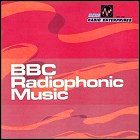 This album, remastered and re-released on CD for the first time just a few years ago, represents the first ten years of the BBC Radiophonic Workshop, formed in the late 50s to provide the BBC’s television and radio productions with “special sound” through unconventional and electronic recording techniques. Even mentioning the words “BBC Radiophonic Workshop” conjures up the old newspaper clipping about how the Queen herself once responded to a mention of the Workshop by saying “Yes, Doctor Who?” – and indeed, that’s the mental leap that most of us make when the now-defunct outfit is mentioned. This album proves that there was a lot more to the Workshop than that.
This album, remastered and re-released on CD for the first time just a few years ago, represents the first ten years of the BBC Radiophonic Workshop, formed in the late 50s to provide the BBC’s television and radio productions with “special sound” through unconventional and electronic recording techniques. Even mentioning the words “BBC Radiophonic Workshop” conjures up the old newspaper clipping about how the Queen herself once responded to a mention of the Workshop by saying “Yes, Doctor Who?” – and indeed, that’s the mental leap that most of us make when the now-defunct outfit is mentioned. This album proves that there was a lot more to the Workshop than that.
That said, if you find the original recording of the Doctor Who theme to be inpenetrably weird, you probably won’t find much enjoyment on this album. The most accessible piece is a short electronic rendition of “Happy Birthday”, while fans of more out-there fare will dig such items as a selection of John Baker’s music from a BBC Radio production of War Of The Worlds, or the truly strange (and yet oddly compelling) “Ziwzih Ziwzih OO-OO-OO”, assembled by Delia Derbyshire (who also, not surprisingly, was the creator of that most famous rendition of Ron Grainer’s Doctor Who music). The latter especially is nearly timeless, with its mixture of backward vocals, found sounds and a thumping, throbbing beat making it seem almost current. And for a track that’s very nearly 40 years old at the time of this writing, that’s not a bad trick. The Workshop was so far ahead of its time, you’d think they had a spare TARDIS in the back at the Maida Vale studio.
Many of the pieces on this album are very short, being either jingles or music beds meant to be talked over by the voices of the BBC’s various regional radio stations at the time. Not being completely familiar with the context, I’m sure I’m missing something here, but it’s still interesting (if occasionally odd) listening.
Best described as what the future used to sound like, this album will appeal to fans who are already familiar  with some of the Radiophonic Workshop’s more well-known work and are curious about what they were doing when they weren’t doing Doctor Who. Fans of analog synthesizers and early electronic music will probably enjoy it too. Folks more accustomed to mainstream fare, however, may find that this album is far too disjointed a collection of sounds that are far too strange for their ear.
with some of the Radiophonic Workshop’s more well-known work and are curious about what they were doing when they weren’t doing Doctor Who. Fans of analog synthesizers and early electronic music will probably enjoy it too. Folks more accustomed to mainstream fare, however, may find that this album is far too disjointed a collection of sounds that are far too strange for their ear.

- Radio Sheffield (0:51)
- Radio Nottingham (1:21)
- Boys And Girls (1:02)
- Mattachin (1:15)
- Pot Au Feu (3:21)
- Time And Tune (0:25)
- Tomorrow World (1:10)
- Reading Your Letters (0:14)
- Blue Veils And Golden Sands (3:33)
- The Missing Jewel (1:03)
- Artbeat (0:40)
- Fresh Start (0:27)
- Christmas Commercial (0:48)
- Sea Sports (0:50)
- The Delian Mode (5:38)
- Happy Birthday (0:36)
- The Frogs Wooing (0:40)
- Milky Way (1:44)
- Structures (3:02)
- New Worlds (0:46)
- Ziwzih Ziwzih OO-OO-OO (1:50)
- Festival Time (0:30)
- The Chase (1:45)
- Towards Tomorrow (1:11)
- Quiz Time (0:59)
- P.I.G.S. (0:52)
- Autumn And Winter (2:03)
- Door To Door (0:30)
- Factors (0:38)
- War Of The Worlds (4:55)
- Crossbeat (0:30)
- Air (1:43)
- Time To Go (0:24)
Released by: BBC Music
Release date: 2003 (originally released in 1968)
Total running time: 47:06
Electric Light Orchestra – Balance Of Power (remaster)
 Released in tandem with the 30th anniversary edition of Out Of The Blue is, oddly, the last album released by anything resembling ELO’s original lineup as a band. In the years after Secret Messages, bassist Kelly Groucutt vanished from the lineup, leaving a three-piece outfit of Bev Bevan, Richard Tandy and Jeff Lynne, looking in this album’s photography like three guys angling for a chance to be extras in the background of a Miami Vice scene. With Lynne tired of touring, and Bevan tiring of Lynne’s increasingly elaborate studio sessions, this was the end of the road for ELO as a group. There’s a certain weariness to the songs that, while it doesn’t prevent them from being decent music, lets one read between the lines a bit. It was all over.
Released in tandem with the 30th anniversary edition of Out Of The Blue is, oddly, the last album released by anything resembling ELO’s original lineup as a band. In the years after Secret Messages, bassist Kelly Groucutt vanished from the lineup, leaving a three-piece outfit of Bev Bevan, Richard Tandy and Jeff Lynne, looking in this album’s photography like three guys angling for a chance to be extras in the background of a Miami Vice scene. With Lynne tired of touring, and Bevan tiring of Lynne’s increasingly elaborate studio sessions, this was the end of the road for ELO as a group. There’s a certain weariness to the songs that, while it doesn’t prevent them from being decent music, lets one read between the lines a bit. It was all over.
For this remastered edition of the now 21-year-old album, we’re treated to more honest-to-God outtakes recorded at the same time as the rest of the album’s tracks than any other ELO remaster since the group’s 1972 album. A strikingly different version of “Heaven Only Knows” is presented here, having become the stuff of legend, played only at pre-concert fan club gatherings and other such functions, as well as vintage 1986 B-sides “Destination Unknown”, “A Matter Of Fact” and “Caught In A Trap”. Some of these have been heard before, on the 1990 box set Afterglow (proof that, even in “retirement,” ELO wasn’t out of circulation for long). The real gem of this CD’s bonus tracks is “In For The Kill” – it’s essentially “Caught In A Trap” in a slightly different form, with almost identical music with completely different and (for Jeff Lynne) atypically almost-political lyrics, but the best part is Lynne’s exploration of almost Crosby, Stills & Nash-inspired harmonies. It’s a crying shame this got left off the original album (especially an album that arrived just a year before the movie Wall Street) because in retrospect, it would’ve been the best, most energetic follow-up single to “Calling America”. This song alone is just about worth the price of the album.
There were still other rarities from this era that could’ve filled out the CD to its full capacity – there also exists a lyric variation for “Matter Of Fact” – but alas, that opportunity was missed and the CD only runs to about an hour.
The album itself is still quite good, better than most critics would have you believe, with tunes like “Calling America” and “Is It Alright” living up to ELO’s best standards, although produced with much more modern technology. In a way, though, the 80s instrumentation and style is probably what hurts Balance Of Power the most – the album is robbed of the relative timelessness of, say, A New World Record, and some songs just become casualties of the 80s. With some of ELO’s best (and better known) material, when Lynne was able to overcome his fixation on a four-to-the-flour disco beat and Chic-style guitar riffs, the songs withstand the test of time better; one listen can pretty much nail this album down to the late ’80s. Not that that’s a bad thing.
 The only truly sad part about it is that this represents the end of the remastered ELO albums, and possibly the mining of that band’s vaults as well. The liner notes booklet talks about Lynne’s revival of ELO for 2001’s Zoom in the past tense, as if that marks the end of the band’s legacy. One wonders if we aren’t being sent a bit of a secret message there.
The only truly sad part about it is that this represents the end of the remastered ELO albums, and possibly the mining of that band’s vaults as well. The liner notes booklet talks about Lynne’s revival of ELO for 2001’s Zoom in the past tense, as if that marks the end of the band’s legacy. One wonders if we aren’t being sent a bit of a secret message there.

- Heaven Only Knows (2:56)
- So Serious (2:43)
- Getting To The Point (4:30)
- Secret Lives (3:32)
- Is It Alright (3:27)
- Sorrow About To Fall (4:04)
- Without Someone (3:51)
- Calling America (3:30)
- Endless Lies (3:00)
- Send It (3:10)
- Opening (0:24)
- Heaven Only Knows (alternate version) (2:34)
- In For The Kill (3:16)
- Secret Lives (alternate take) (3:26)
- Sorrow About To Fall (alternate mix) (3:50)
- Caught In A Trap (3:47)
- Destination Unknown (4:10)
Released by: Epic / Legacy
Release date: 2007 (originally released in 1986)
Total running time: 56:10
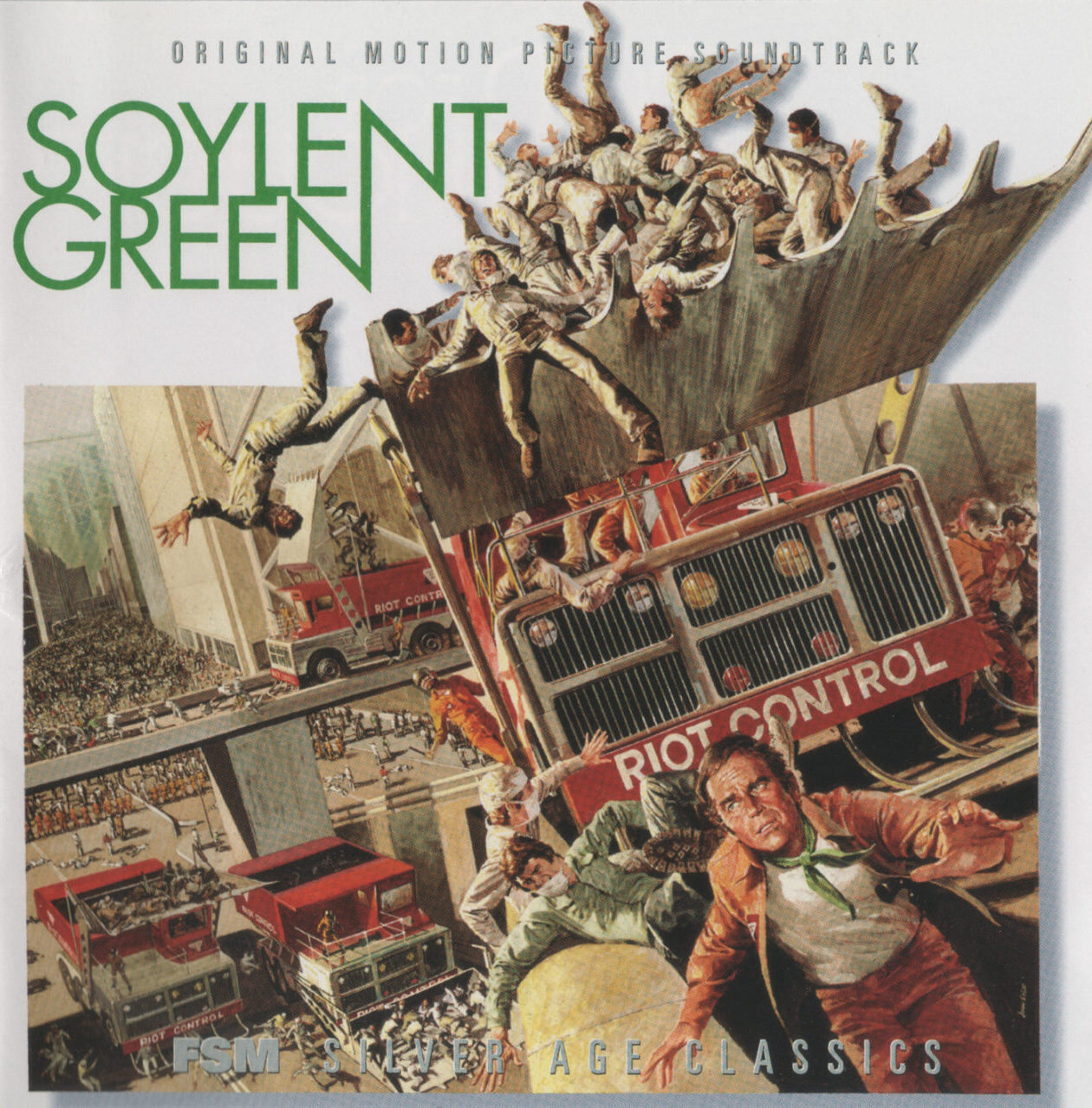
Soylent Green / Demon Seed
This disc brings together the sparse scores for two futuristic ’70s techno-dystopia flicks for their first official release, complete with the usual wealth of knowledge that’s packed into the CD booklet on any of Film Score Monthly’s releases.
In the past, Soylent Green has been mentioned on this site as “a great place to see a pristine Computer Space machine,” but it turns out that, away from the dialogue of this Charlton Heston hand-wringer, the music is another oustanding feature of Soylent Green that stands up over time. Fred Myrow’s music for the movie’s introductory montage is an absolute revelation, blending rhapsodic strings, experimental electric guitars, and an honest-to-God hip-hop shuffle, years before anyone was calling it that. It starts out quiet and rather relaxing, and then builds to a busy, bustling peak about 2/3 of the way in, a musical illustration of the movie’s overpopulation problem. It’s just a great little piece of underscore – I think I listened to that track five times in a row when I first listened to this CD, because it’s just so stunning.
The various themes the run throughout the rest of the score are established in those opening titles as well, though in slightly different forms. It all adds up to a very cohesive score, and quite an impressive musical feat overall. I like the movie itself as a guilty pleasure, but I have no qualms about saying that the music is better than the movie, and I’m glad it can be heard here.
In a completely different vein musically is the 1977 techno-horror thriller Demon Seed, whose score was composed by original Star Trek veteran Jerry Fielding. If you’re expecting it to sound even vaguely like a classic Trek score, think again – Fielding goes largely electronic here, befitting the movie’s theme of a rapacious supercomputer that decides it needs to reproduce (with Julie Christie, no less). Rather like Soylent Green, Demon Seed hasn’t really aged very gracefully, though its sometimes abstract music was ahead of its time. Fans of early ’70s analog synth music should give this one a shot. Heard without dialogue or effects, it’s some very interesting music.
 Though one might not normally think of these two films at the same time, this album is one of the best (and naturally, one of the more obscure) gems in Film Score Monthly’s library, and I highly recommend it.
Though one might not normally think of these two films at the same time, this album is one of the best (and naturally, one of the more obscure) gems in Film Score Monthly’s library, and I highly recommend it.
Soylent Green
- Prologue / Opening City Music (4:20)
- Can I Do Something For You? (1:47)
- Out For A Walk / Nothing Like This / Assassin Approaches / Necessary To God / New Tenant (5:29)
- Stalking The Pad (1:41)
- Tab’s Pad / Furniture Party (3:43)
- Shirl And Thorn (2:08)
- Home Lobby Source (2:58)
- Sol’s Music (6:29)
- Symphony Music (Tchiakovsky / Beethoven / Grieg) (6:17)
- Infernal Machine / Thorn In Danger / Are You With Us? / Alternate City Opening / End Credits (5:13)
Demon Seed
- Birth Scene / Speaking Room / Elk Herd (3:17)
- Proteus Requests / Light On / Your Phone Is Out (8:25)
- Visiting Hours / Probed And Put To Bed (3:24)
- The Gaz Chamber / Rape Of The Earth / How? / Hypnosis / Chimes (8:23)
- Pre-Trip / Big Wind / Sperm / Spirograph / Tetra Waltz (7:18)
- Last Voyage (2:35)
- Closing Crawl (2:03)
- End Credits (3:59)
Released by: Film Score Monthly
Release date: 2003
Total running time: 79:49
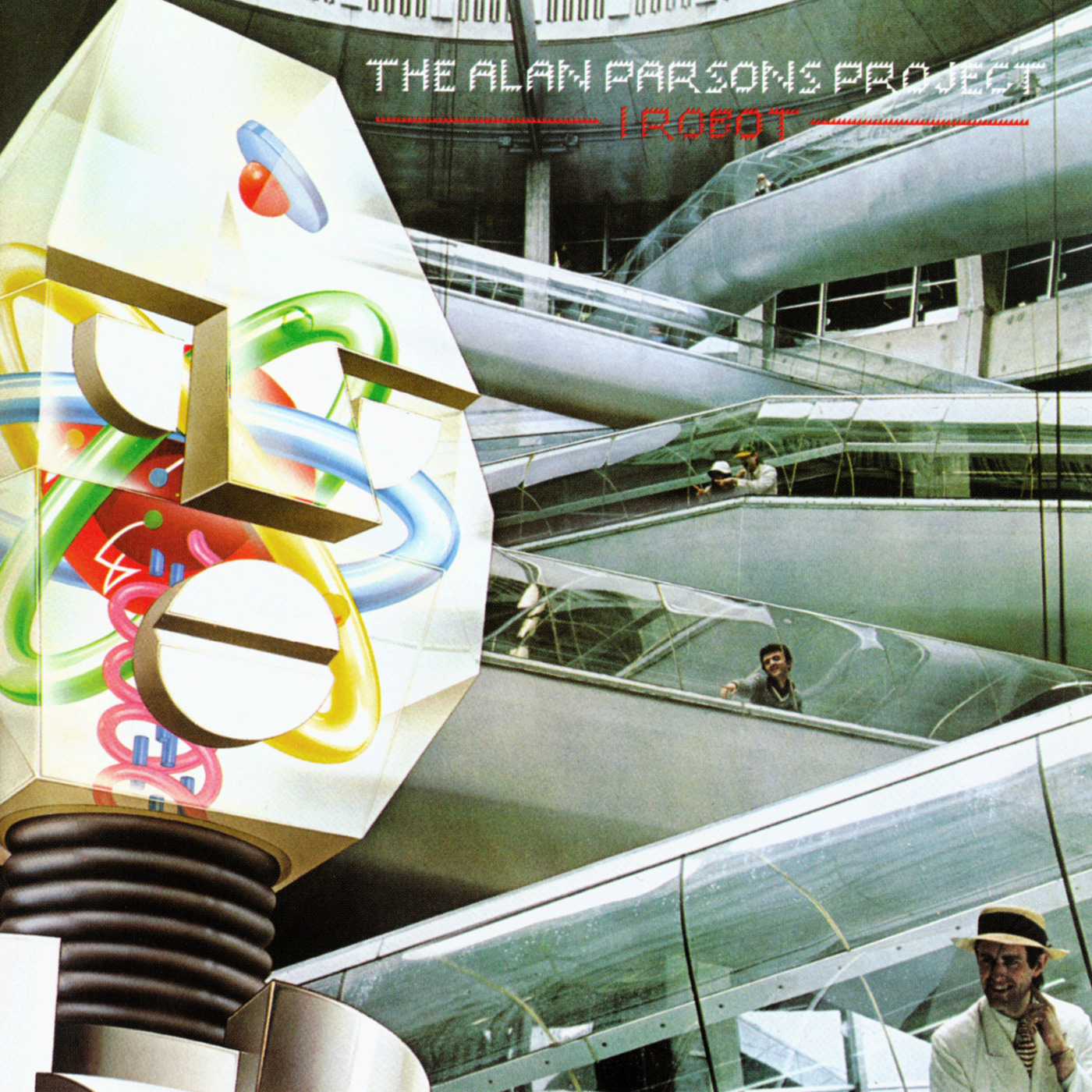
Alan Parsons Project – I Robot (remaster)
 If someone was deliberately trying to drain my wallet, one could hardly concoct a more diabolical scheme than releasing remastered CDs of classic ELO and Alan Parsons Project albums, with extra tracks and bonus material, at the same time. This is indeed happening, and all under the watchful eye (in the sky?) of Sony, no less. As a preamble, I’ve always felt that if you’re already a fan of either ELO or Alan Parsons Project, you’re primed to be a fan of the other. Musically, they’re miles apart, with the lyrical and thematic gloominess of Parsons and Project partner Eric Woolfson counterpointing Jeff Lynne’s “Mr. Blue Sky” cheer. But stylistically, these two very different groups are in the same ball park: lush orchestration, banging against the walls of what constitutes rock and threatening to leave a hole big enough for classical to seep into the room – to say nothing of mesmerizing overdubbed harmonies and widescreen production. I’ve always loved both.
If someone was deliberately trying to drain my wallet, one could hardly concoct a more diabolical scheme than releasing remastered CDs of classic ELO and Alan Parsons Project albums, with extra tracks and bonus material, at the same time. This is indeed happening, and all under the watchful eye (in the sky?) of Sony, no less. As a preamble, I’ve always felt that if you’re already a fan of either ELO or Alan Parsons Project, you’re primed to be a fan of the other. Musically, they’re miles apart, with the lyrical and thematic gloominess of Parsons and Project partner Eric Woolfson counterpointing Jeff Lynne’s “Mr. Blue Sky” cheer. But stylistically, these two very different groups are in the same ball park: lush orchestration, banging against the walls of what constitutes rock and threatening to leave a hole big enough for classical to seep into the room – to say nothing of mesmerizing overdubbed harmonies and widescreen production. I’ve always loved both.
Released in 1977, I, Robot is the Project’s second album, but its first for the Arista label, which would release the rest of the group’s output until it disbanded in 1990. (Sony’s acquisition of Arista and its back catalog is what brought these remastered editions about; the rights to the groundbreaking first album are held by Mercury, which will capitalize on remaster fever by reissuing that album as a double-CD set later this year.) While at times this album seems to be trying a little more self-consciously to “fit in with the times” (“The Voice”‘s brief dive into disco territory, “I Wouldn’t Want To Be Like You”‘s funky rhythm section), it’s also surprisingly forward-looking for relatively mainstream ’70s prog rock.
In addition to the outstanding original album, presented in crystal clear remastered sound (coincidentally, with the help of Jeff Magid and Tim Fraser-Harding, who oversaw the recent ELO remasters), which upon more recent listening has withstood the test of time better than I think I’ve previously given it credit for (despite elements that clearly mark it as a creation of the 1970s), there are a few early demo recordings and instrumental mixes. There’s a fantastic instrumental of “I Wouldn’t Want To Be Like You”, missing only the vocals and Ian Bairnson’s ferocious guitar solo, as well as demos of “Day After Day”, “Breakdown” (sounding almost like a soulful ballad) and “I Robot” itself, the latter being a weird experiment using the sound of metal balls bouncing. “The Naked Robot” is a medley gathering instrumental bits, pieces and snippets from several of the songs, including a great many elements and ideas left on the cutting room floor, never to be heard in the final album.
The booklet itself is a wealth of information, revealing that Parsons and Woolfson actually approached Isaac Asimov to sound him out on the idea of basing a prog rock opera on “I, Robot”, but since any adaptation rights were tied to the long-stalled film rights, they had to knock the comma out of the title and adjust their thematic  approach every so slightly. The book also pins a lot of the group’s success on the coincidence that I Robot arrived in record stores immediately on the heels of Star Wars with a robot on the cover and a futuristic theme in its music. It might be true, who knows? But it certainly didn’t hurt that it was a great album to begin with.
approach every so slightly. The book also pins a lot of the group’s success on the coincidence that I Robot arrived in record stores immediately on the heels of Star Wars with a robot on the cover and a futuristic theme in its music. It might be true, who knows? But it certainly didn’t hurt that it was a great album to begin with.
- I Robot (6:02)
- I Wouldn’t Want To Be Like You (3:23)
- Some Other Time (4:05)
- Breakdown (3:53)
- Don’t Let It Show (4:25)
- The Voice (5:23)
- Nucleus (3:22)
- Day After Day (The Show Must Go On) (3:57)
- Total Eclipse (3:12)
- Genesis Ch.1 V.32 (3:30)
- Boules (I Robot Experiment) (1:59)
- Breakdown (early demo) (2:11)
- I Wouldn’t Want To Be Like You (backing track rough mix) (3:29)
- Day After Day (early stage rough mix) (3:41)
- The Naked Robot (10:19)
Released by: Legacy / Arista
Release date: 2007 (originally released in 1977)
Total running time: 62:51
The Complete Sounds Of Katamari
 The final release in a trilogy of soundtracks accompanying the trilogy of Katamari games (Katamari Damacy, We Love Katamari and the PSP title Me And My Katamari), The Complete Sounds Of Katamari is an unusual combination of material, ranging from the music of Me & My Katamari to previously unreleased tracks from We Love Katamari to tunes from other Namco video games with no Katamari connection at all. But as with the previous two soundtracks in the series, Complete Sounds has enough gems of pure musical cheerfulness to offer that it’s easy to overlook any lack of cohesiveness.
The final release in a trilogy of soundtracks accompanying the trilogy of Katamari games (Katamari Damacy, We Love Katamari and the PSP title Me And My Katamari), The Complete Sounds Of Katamari is an unusual combination of material, ranging from the music of Me & My Katamari to previously unreleased tracks from We Love Katamari to tunes from other Namco video games with no Katamari connection at all. But as with the previous two soundtracks in the series, Complete Sounds has enough gems of pure musical cheerfulness to offer that it’s easy to overlook any lack of cohesiveness.
As one might expect, the first disc – featuring only music from the Katamari games – has moments of pure gold, as well as moments that really work better as in-game music than stand-alone listening material. “Shine! Mr. Sunshine” is a highlight of the tracks from Me & My Katamari, with a soulful, southern gospel feel that’s almost unexpected after its opening, which is a short, NES-style rendition of the Katamari theme. That theme is reinterpreted and experimented with endlessly, in such tracks as “Katamari On The Moog” and “Katamari On The Funk” (to name just two of the better tracks). From track 10 onward, the first disc presents music from We Love Katamari that didn’t make it onto that game’s soundtrack CD; a favorite among these is the quirky “One Tip March.”
Disc two’s tracks are more symphonic in nature, and hail from such games as Splatterhouse and Tales Of Eternia Online – an interesting mix to be sure. There are also a few tracks of ambient  outdoor sound effects. It’s almost like a Namco “best of” collection, but given how expensive this 2-CD set can be (depending on where one gets it), one wonders why Namco didn’t just divide this package into two separate releases and save some of us who are really after more Katamari music the money.
outdoor sound effects. It’s almost like a Namco “best of” collection, but given how expensive this 2-CD set can be (depending on where one gets it), one wonders why Namco didn’t just divide this package into two separate releases and save some of us who are really after more Katamari music the money.
It’s all a nice package of music, but certainly a strange collision of styles and sources.
Disc One
- Overture III (2:35)
- Katamari On The Funk (10:22)
- Katamaresort (3:04)
- Shabadoobie (3:01)
- Jesus Island (4:47)
- Family Damacy (4:41)
- Katamari On The Moog (0:32)
- Shine! Mr. Sunshine (5:36)
- Katamarhythm Box (1:41)
- Dan Don Fuga (2:14)
- Tron The Grasslands (4:27)
- One Tip March (2:43)
- Do Re Mi Katamari Do (3:13)
- Starlight Jamboree (2:56)
- Everyone Dancing Katamari Damacy (1:00)
- Love & Peace & Katamari Damacy (0:43)
- Big Cosmos Salon (3:03)
Disc Two
- In A Muddle (7:05)
- Kanewood Edge – Morning (0:40)
- None But the Lonely Heart (Op. 6-6) (2:51)
- Presto Scherzando (1:35)
- Appassionate, Allegro Moderato (2:15)
- Super Taiko Damacy (0:59)
- None But the Lonely Heart (Op. 6-6) (2:58)
- Super Taiko Damacy (Refrain) (0:26)
- Sadness (1:42)
- Stizzoso (1:08)
- Kanewood Edge – Day (0:33)
- Con Energico (5:49)
- Sento Nel Core (Arrange Version from Splatterhouse (4:24)
- Kuttsuki Taro (2:43)
- Misterioso (3:03)
- Chaotic Ambience (0:54)
- Andante, Con Moto, Grandioso (1:41)
- Big Fire (1:55)
- Night Moo Moo (0:41)
- Kanewood Edge – Star (9:55)
Released by: Columbia Japan
Release date: 2005
Disc one total running time: 56:38
Disc two total running time: 53:17
Electric Light Orchesta – Out Of The Blue (remaster)
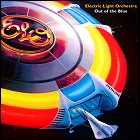 Out Of The Blue is, quite simply, one of the most iconic albums of the ’70s, hands-down. It seems that, despite its intricate arrangements and impeccable musicianship, this album will simply never have the rock critic cachet of, say, Dark Side Of The Moon. And yet these days, one hears more young artists coming out of the woodwork trying to achieve the sound of Jeff Lynne and company than one hears Pink Floyd sound-alikes. You can do the math there if you like.
Out Of The Blue is, quite simply, one of the most iconic albums of the ’70s, hands-down. It seems that, despite its intricate arrangements and impeccable musicianship, this album will simply never have the rock critic cachet of, say, Dark Side Of The Moon. And yet these days, one hears more young artists coming out of the woodwork trying to achieve the sound of Jeff Lynne and company than one hears Pink Floyd sound-alikes. You can do the math there if you like.
This remastered edition adds only a handful of bonus material, largely because the original double LP takes up most of a single CD. (I would’ve been happy to go to two CDs, a la the remasters of ELO’s first two albums, but there’s not much indication that there was really enough material to go that route.) The one full bonus track that isn’t a demo or other form of outtake is the lovely “Latitude 88 North,” a song which, according to the notes, was partially written at the same time as the other Out Of The Blue tracks but just didn’t make the cut. Of the various bonus tracks that have come along since the Flashback box set ushered in this new era of “remastered with a few freshly recorded bonus tracks” activity, “Latitude 88 North” is the best one to come along since “Love Changes All” and “Helpless” (or, for that matter, Zoom). Even if it’s clearly a recent recording (at best, the song itself may be 30 years old, but the track itself is much more recent), it’s a great song that hearkens back to ELO’s glory days, and it at least sounds closer to that classic style than “Surrender” (from the remastered A New World Record) does. Bringing up the rear are an excerpt from a demo of “Wild West Hero” (which demonstrates great harmony, but lousy lyrics that were replaced in the final version) and the rousing instrumental “The Quick And The Daft”, which most certainly is a 1977 original – good material for serious fans and students of ELO’s work to chew on, but nothing that will really excite casual listeners.
Fortunately for casual listeners, one of the most iconic albums of the ’70s is still here, perfectly intact and remastered, and it’s never sounded better. The remastering isn’t so radical as to have me reassesing my favorite songs, but it’s nice to hear them cleaned up and sounding sharper than ever before. The booklet-style case is also a treat, with an extensive set of notes about the making of Out Of The Blue. There’s a standard version of this CD with a slightly pared-down version of that booklet, but the deluxe edition – bound like a little book, featuring the full liner notes and even a miniature replica of the original LP’s punch-out cardstock spaceship – is a real treat for fans of the band’s work. I’ll admit I just haven’t had the heart to punch out the spaceship and build it, though; I did that with the one that came with the LP, years and years and years ago, and lost track of that one; I think I’ll leave this one intact, and maybe when my own child is around the same age I was when I first heard this album, it’ll be punched out and put together.
 Not a bad package at all, celebrating an album that means a lot to quite a few people, even those who would never in a million years profess to be ELO fans. Though I’d wager that the original release of Out Of The Blue created plenty of those as well.
Not a bad package at all, celebrating an album that means a lot to quite a few people, even those who would never in a million years profess to be ELO fans. Though I’d wager that the original release of Out Of The Blue created plenty of those as well.

- Turn To Stone (3:49)
- It’s Over (4:08)
- Sweet Talkin’ Woman (3:49)
- Across The Border (3:53)
- Night In The City (4:03)
- Starlight (4:31)
- Jungle (3:53)
- Believe Me Now (1:21)
- Steppin’ Out (4:40)
- Standin’ In The Rain (3:59)
- Big Wheels (5:32)
- Summer And Lightning (4:15)
- Mr. Blue Sky (5:03)
- Sweet Is The Night (3:27)
- The Whale (5:07)
- Birmingham Blues (4:23)
- Wild West Hero (4:45)
- Wild West Hero (alternate bridge – home demo) (0:26)
- The Quick And The Daft (1:50)
- Latitude 88 North (3:24)
Released by: Epic / Legacy
Release date: 2007 (originally released in 1977)
Total running time: 76:18
Music For 2001: a space odyssey – music by Alex North
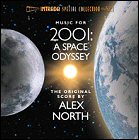 The subject of literally decades of debate among film scholars, soundtrack afficionados and others, Alex North’s rejected score for Stanley Kubrick’s 2001: a space odyssey has already received one release, though in a form that was re-recorded from the ground up by Jerry Goldsmith in 1993. In the liner notes from that earlier release, it is revealed that the only surviving copy of North’s original 1968 session recordings was a cassette that had been missing virtually since the movie came out, recovered on the eve of Goldsmith’s sessions. This release from Intrada is that cassette: the original sessions, brought up as close as possible to digital specs, timed out to scenes from the movie, and released to the public for the first time.
The subject of literally decades of debate among film scholars, soundtrack afficionados and others, Alex North’s rejected score for Stanley Kubrick’s 2001: a space odyssey has already received one release, though in a form that was re-recorded from the ground up by Jerry Goldsmith in 1993. In the liner notes from that earlier release, it is revealed that the only surviving copy of North’s original 1968 session recordings was a cassette that had been missing virtually since the movie came out, recovered on the eve of Goldsmith’s sessions. This release from Intrada is that cassette: the original sessions, brought up as close as possible to digital specs, timed out to scenes from the movie, and released to the public for the first time.
There are subtle musical differences and major ones too. Slight differences in arrangement, orchestration and timing differentiate between the two recordings of this most famous selection of unused movie music, and there are some that are biggies (entire minutes of music and alternate arrangements that didn’t make it into the 1993 re-recording, as well as the revelation that the “Entr’acte”track from that release was mislabeled and had nothing to do with 2001 at all). It’s a fascinating study in contrasts, but in the end, it’s still great music. How the use of this score instead of Kubrick’s favored selection of existing orchestral and choral pieces might have impacted the movie’s timelessness, we’ll never know.
Thanks to the incredibly extensive liner notes, though, you have a unique opportunity to test-drive North’s score – each track includes precise, down-to-the-second timing notes allowing you to sync up your DVD of 2001 to the film in the appropriate places. The liner notes booklet also tells, in great detail, the story of the feud between North and Kubrick over Kubrick’s quiet (but public) dismissal of North’s music, and how that feud carried on the two men’s respective estates even after they themselves had died. The back cover of the booklet contains, at last, an olive branch extended in writing from Kubrick’s estate to North’s children, acknowledging that North’s music is an important part of the film’s legacy. It’s disappointing that the proposal for a DVD with an alternate audio track, also revealed in the booklet, never got off the ground, but the booklet’s notes let you do it yourself at home without having to buy yet another iteration of 2001 on DVD, so perhaps it’s just as well.
 Few soundtracks in the history of Hollywood have as much of a story behind them as this one does, but Alex North’s 2001 can now finally be heard and appreciated, with the film it was intended to accompany. That neither North nor Kubrick could ever bury the hatchet so this could happen in either of their lifetimes is the only disappointment to come out of it.
Few soundtracks in the history of Hollywood have as much of a story behind them as this one does, but Alex North’s 2001 can now finally be heard and appreciated, with the film it was intended to accompany. That neither North nor Kubrick could ever bury the hatchet so this could happen in either of their lifetimes is the only disappointment to come out of it.

- The Foraging (3:13)
- The Bluff (2:39)
- Night Terrors (1:49)
- Bones (1:43)
- Eat Meat And Kill (4:03)
- Space Station Docking (5:24)
- Space Talk (3:49)
- Trip To Moon (3:05)
- Moon Rocket Bus (5:20)
- The Foraging (alternate version) (3:16)
- Eat Meat And Kill (Take 7 wild) (1:06)
- Space Station (Take 4 partial) (2:13)
- Docking (Take 2) (1:15)
Released by: Intrada
Release date: 2007 (originally recorded in 1968)
Total running time: 38:55
Crowded House – Farewell To The World
 On November 24th, 1996, the original lineup of Crowded House (plus longtime touring musician and recent full-time recruit Mark Hart) took its final bow on the steps of the Sydney Opera House, with a crowd of somewhere around 200,000 people making it the biggest concert anywhere in the world that year – ironic when one considers that the whole thing started out with Neil Finn’s suggestion for a humble, small-scale farewell performance for the group’s final public outing…at least in that form.
On November 24th, 1996, the original lineup of Crowded House (plus longtime touring musician and recent full-time recruit Mark Hart) took its final bow on the steps of the Sydney Opera House, with a crowd of somewhere around 200,000 people making it the biggest concert anywhere in the world that year – ironic when one considers that the whole thing started out with Neil Finn’s suggestion for a humble, small-scale farewell performance for the group’s final public outing…at least in that form.
Farewell To The World has wowed me for a long time, going all the way back to its VHS video release, and I’ve always wondered where in the world the obligatory CD was. To celebrate the tenth anniversary of the group’s final performance (as well as to get the Crowded House name back in the public eye just in time for a reunion album and tour), Farewell is finally available on CD and DVD, and it even sidesteps my natural inclination to grumble about re-releases that this edition includes some material that didn’t appear on my now well-worn videotape of the event. Still, this should’ve been on CD years ago.
It’s difficult to overstate just how good a live band Crowded House was. Part of the reason Neil Finn closed the books on Split Enz was to focus on a less “produced” sound that could be more faithfully captured on stage. At least that was the idea before the band teamed up with producer Mitchell Froom, who added churchy organ solos, sampled strings and horns, to name just a few of the touches which meant that the group couldn’t tour without a keyboard wizard in tow. But even with that in mind, the band pulls it off incredibly well here. Songs like “Private Universe” and “Hole In The River,” already more than listenable, take on new life here. (Even with two studio versions of “Private Universe” out there, I consider this performance to be the definitive reading.)
Farewell To The World was already a historical document of sorts, but with Paul Hester’s tragic death, it becomes even moreso. Paul gets his moment in the spotlight during “Sister Madly”, serving as both drummer and comedian, though his impression of Tina Turner falls a little bit flat when robbed of its visual component (file it under “you had to be there”); I’m a little surprised it’s actually on the CD at all. I don’t recall hearing “Italian Plastic” on the previous video release either. To say the whole band is on top form is a bit of an understatement, and I’ve especially got to single out Mark Hart’s luxurious walls of electric guitar feedback, never overpowering but always atmospheric.
Perhaps the most surprising thing about Farewell on CD is that it was a bit of, for the lack of a better term, “stealth marketing” presaging the return of Crowded House to the studio and the stage. I’m eagerly awaiting the new album and tour, but I can truthfully see where both camps are coming from (Pro-Crowdies Reunion vs. Get Back Together But Don’t Call It Crowded House Without Paul). As with the reunion itself, it’s too bad that it took a tragedy to finally get this into our CD players.
Disc one:
- Mean To Me (4:11)
- World Where You Live (3:33)
- When You Come (5:54)
- Private Universe (5:35)
- Four Seasons In One Day (2:54)
- Fall At Your Feet (3:25)
- Whispers & Moans (4:30)
- Hole In The River (6:47)
- Better Be Home Soon (4:43)
- Pineapple Head (4:04)
- Distant Sun (4:51)
- Into Temptation (4:49)
- Everything Is Good For You (4:09)
Disc two:
- Locked Out (3:49)
- Something So Strong (3:51)
- Sister Madly (4:54)
- Italian Plastic (3:51)
- It’s Only Natural (5:07)
- Weather With You (5:22)
- There Goes God (4:54)
- Fingers Of Love (5:35)
- In My Command (4:26)
- Throw Your Arms Around Me (2:57)
- Don’t Dream It’s Over (6:22)
Released by: Capitol
Release date: 2007
Disc one total running time: 59:25
Disc two total running time: 51:08
Electric Light Orchestra – Face The Music (remaster)
 One of the three most recently remastered ELO albums, Face The Music is long overdue for a fresh listen, being – arguably – the first album of the band’s golden years. It’s also the album with “Evil Woman” and “Face The Music” on it, which certainly doesn’t hurt. (Sadly, during the remastering process, nobody remembered to kick “Down Home Town” out of the original track listing.)
One of the three most recently remastered ELO albums, Face The Music is long overdue for a fresh listen, being – arguably – the first album of the band’s golden years. It’s also the album with “Evil Woman” and “Face The Music” on it, which certainly doesn’t hurt. (Sadly, during the remastering process, nobody remembered to kick “Down Home Town” out of the original track listing.)
As with the other remastered titles from ELO’s back catalog, the sound has been sharpened up quite a bit, softening a few rough edges that had become noticeable with repeat listens. The obligatory bonus tracks are included as well, though they’re not much to write home about. In the liner notes booklet, Jeff Lynne says he prefers the slightly longer, stripped-down and orchestra-free new mix of “Evil Woman,” but even with that extra verse and chorus that we hadn’t heard before, something is just missing without that big string section adding to the song. Similarly, a series of demos for the menacing “Fire On High” intro will interest serious students of Lynne’s work, but maybe not anyone else, and the U.S. single edit of “Strange Magic” isn’t so staggeringly different as to be a real revelation.
That said, it’s surprising that a song that we have heard before turns out to be the real gem of the bonus tracks. Closing out this new edition of Face The Music is a completely instrumental mix of Waterfall, with the full-up instrumentation both from ELO’s rhythm section and from the studio orchestra – all that’s missing is the vocals. (Maybe I shouldn’t say this, but I’m wondering if Lynne’s ever thought of re-re-releasing some of ELO’s material in this form, both for the karaoke fans out there and those of us who just love the intricate arrangements.) Heard in all of its vocal-less glory, “Waterfall” is an excellent candidate for this treatment, standing out as a fantastic performance even as an instrumental.
 Whether or not one really great instrumental of a song you’ve already heard is worth buying the album over again is up to you, but that alone is just about worth the price of admission for die-hard ELO fans – and in the end, “Down Home Town” aside, Face The Music is still a fine album and a prime specimen of early ’70s rock.
Whether or not one really great instrumental of a song you’ve already heard is worth buying the album over again is up to you, but that alone is just about worth the price of admission for die-hard ELO fans – and in the end, “Down Home Town” aside, Face The Music is still a fine album and a prime specimen of early ’70s rock.

- Fire On High (5:31)
- Waterfall (4:11)
- Evil Woman (4:29)
- Nightrider (4:26)
- Poker (3:32)
- Strange Magic (4:29)
- Down Home Town (3:54)
- One Summer Dream (5:51)
- Fire On High Intro (alternate mix) (3:23)
- Evil Woman (stripped-down mix) (5:00)
- Strange Magic (U.S. single edit) (3:27)
- Waterfall (instrumental mix) (4:15)
Released by: Epic / Legacy
Release date: 2006 (originally released in 1975)
Total running time: 52:28
Weird Al Yankovic – Straight Outta Lynwood
 There’s nothing quite like Weird Al Yankovic firing on all cylinders. Much moreso than most of the targets of his satire, the man has a talent that defies time’s every attempt to pass him by. He’s even endured the wrath of a few of the artists he’s parodied (such as Coolio), or their labels (Atlantic actually vetoed a song that was recorded for this album – and so, unable to sell it, Weird Al released it for free on his web site). He’s definitely a force to be reckoned with.
There’s nothing quite like Weird Al Yankovic firing on all cylinders. Much moreso than most of the targets of his satire, the man has a talent that defies time’s every attempt to pass him by. He’s even endured the wrath of a few of the artists he’s parodied (such as Coolio), or their labels (Atlantic actually vetoed a song that was recorded for this album – and so, unable to sell it, Weird Al released it for free on his web site). He’s definitely a force to be reckoned with.
And yet, if there’s one problem with Straight Outta Lynwood, it’s that this album is nothing like Weird Al firing on all cylinders. There’s a roughly equal number of hits and misfires here. When the songs hit their target, whether they’re parodies or originals, they’re some of the best of his career. “Don’t Download This Song” is a wickedly funny original that picks on everything from ’80s Chicago to bloated “We Are The World”-style all-star charity epics. “Virus Alert” sets the now-ubiquitous virus hoax e-mail trend to tremendously catchy music. And of course, there’s the biggest hit single of Weird Al’s career, “White & Nerdy.” I also have to single out the surreal “Weasel Stomping Day” and “Polkarama” – the obligatory polka medley of current top 40 hits – for special praise.
Where it misfires, though, Lynwood misses by quite a margin. “Pancreas” is a “style parody” of classic Beach Boys ballads (with a special emphasis on “God Only Knows” though it steers clear of mocking any single song musically) that just never quite comes in for a landing. A certain overblown R. Kelly pseudo-epic becomes the fodder for “Trapped In The Drive-Thru”, which is one of those songs that’s funny the first time around, but as with a lot of Weird Al’s longer songs (I’m looking at you, “Genius In France”), it grates on repeat  listening (“Albuquerque”, it ain’t). And maybe I’m missing the joke, but “Canadian Idiot” seems atypically mean-spirited for Al.
listening (“Albuquerque”, it ain’t). And maybe I’m missing the joke, but “Canadian Idiot” seems atypically mean-spirited for Al.
All this being said, I still give Straight Outta Lynwood high marks, because on average, I’d rather listen to half of a good Weird Al album than an entire album from most of the targets of his satire.
- White & Nerdy (2:50)
- Pancreas (3:48)
- Canadian Idiot (2:23)
- I’ll Sue Ya (3:51)
- Polkarama (4:54)
- Virus Alert (3:46)
- Confessions Part III (3:52)
- Weasel Stomping Day (1:34)
- Close But No Cigar (3:55)
- Do I Creep You Out (2:46)
- Trapped In The Drive-Thru (10:51)
- Don’t Download This Song (3:54)
Released by: Volcano
Release date: 2006
Total running time: 48:24
